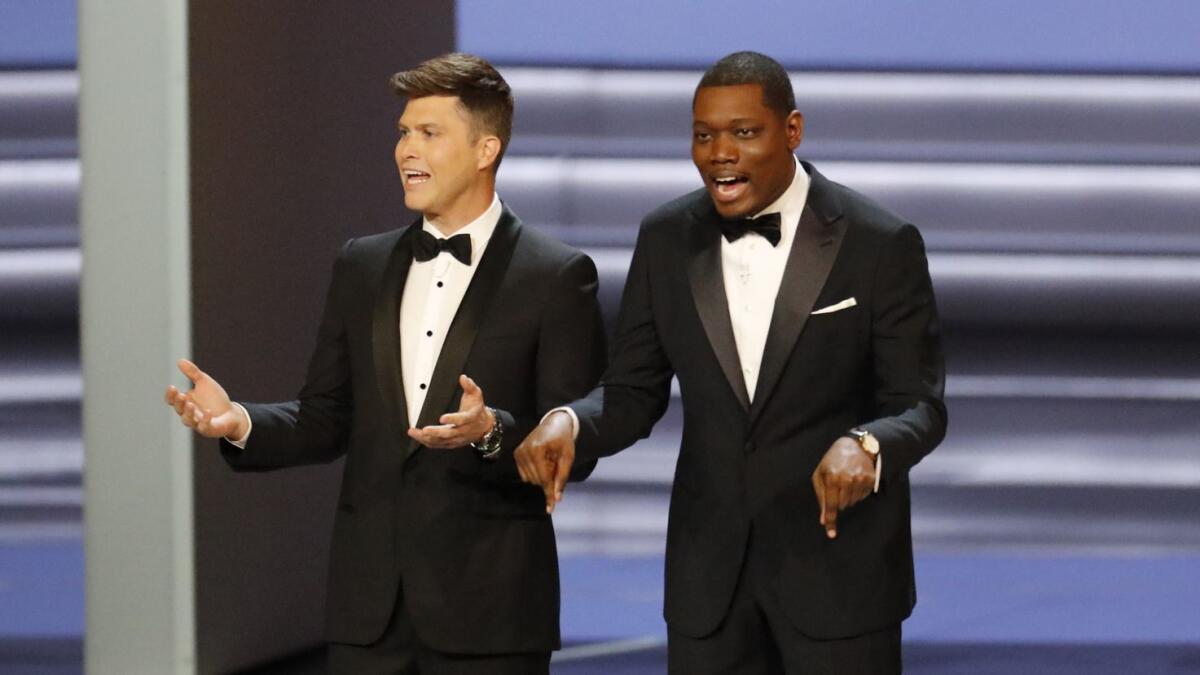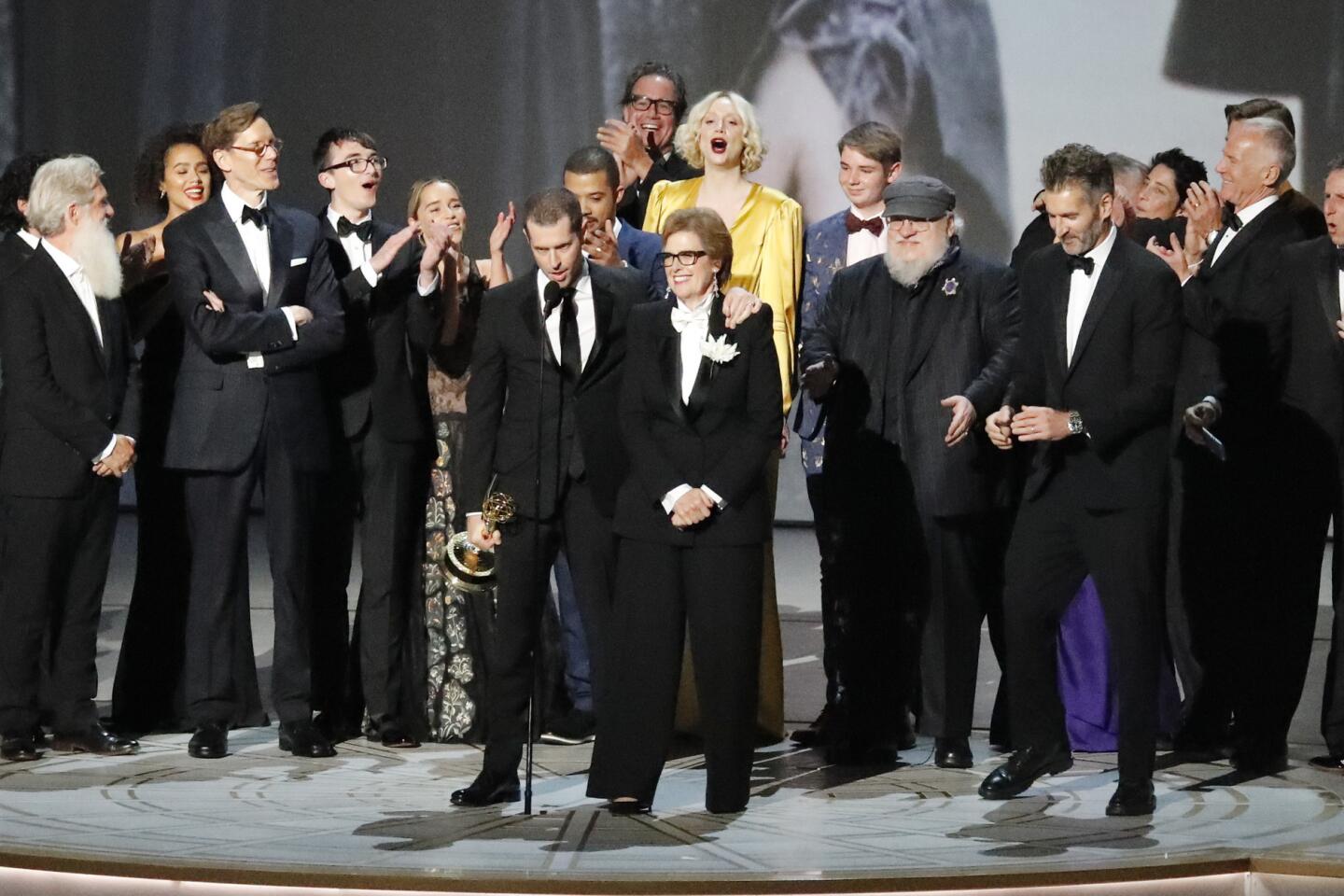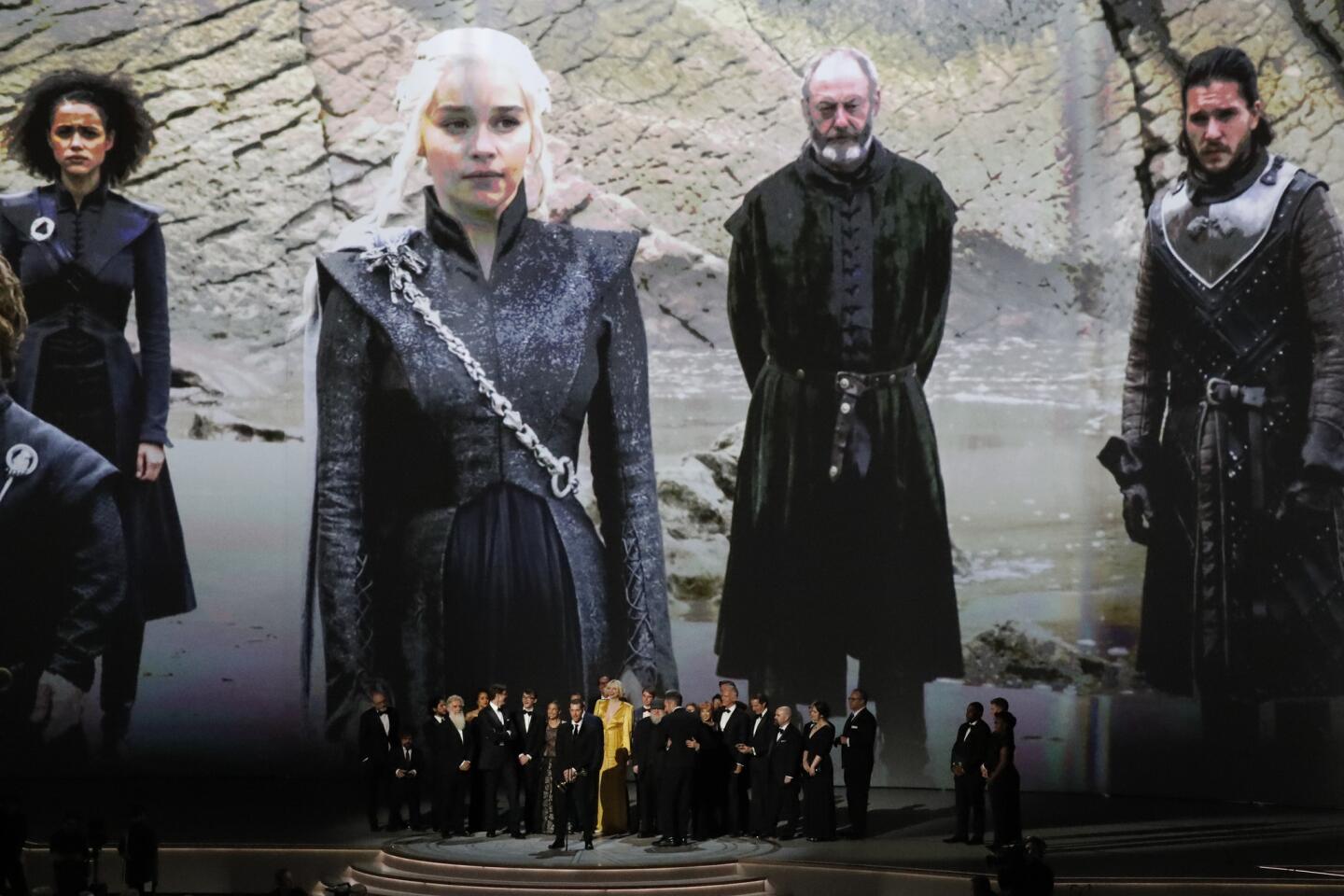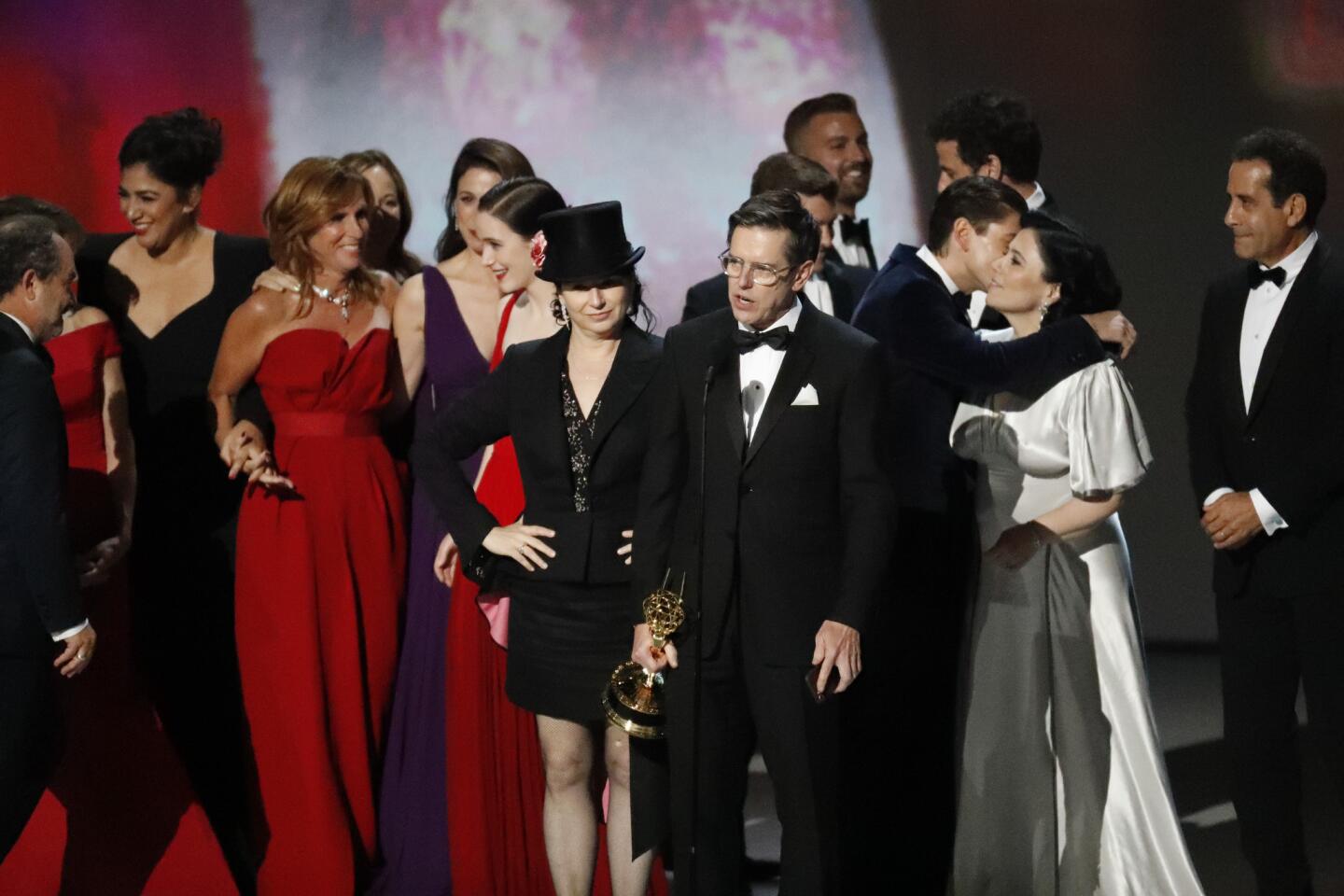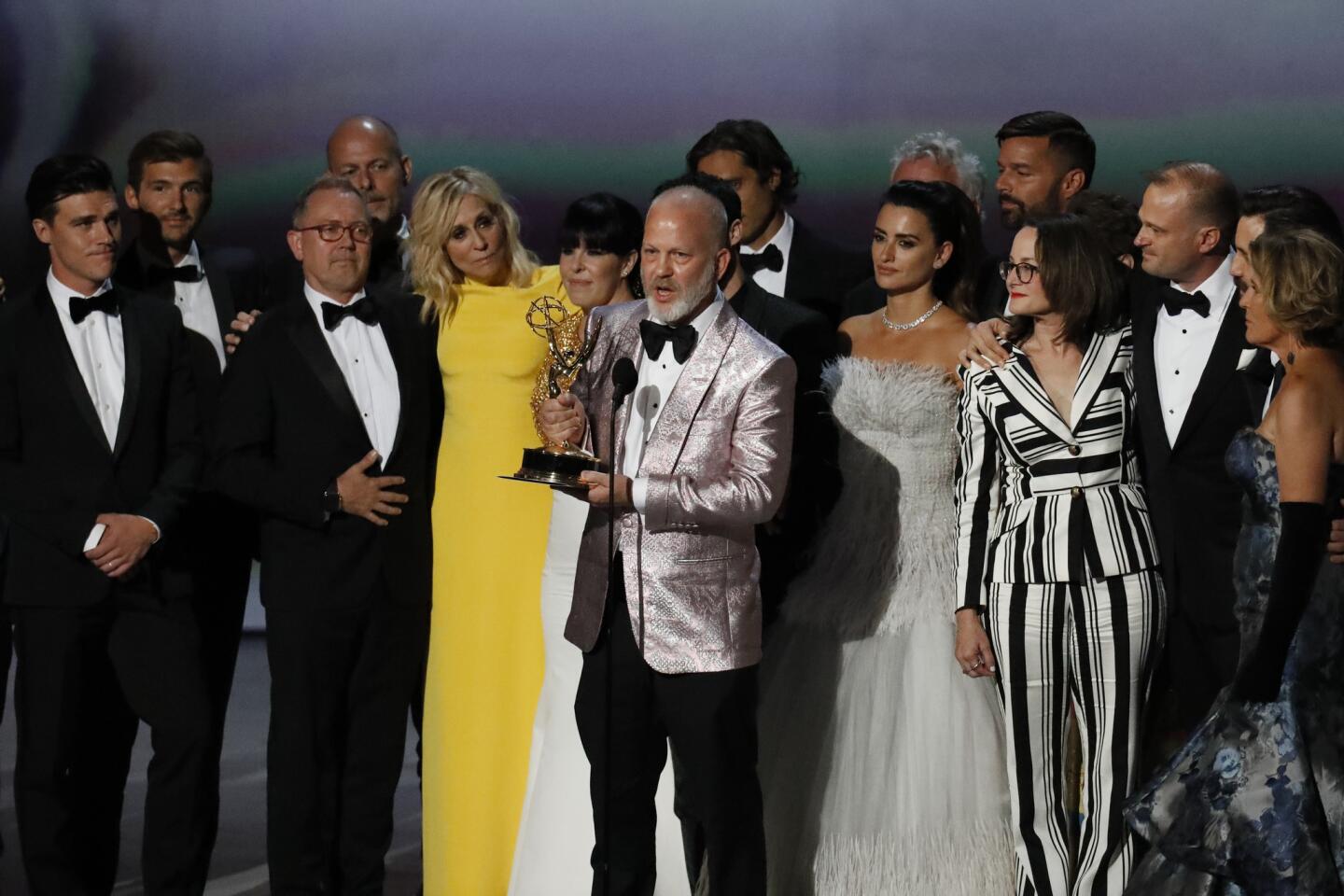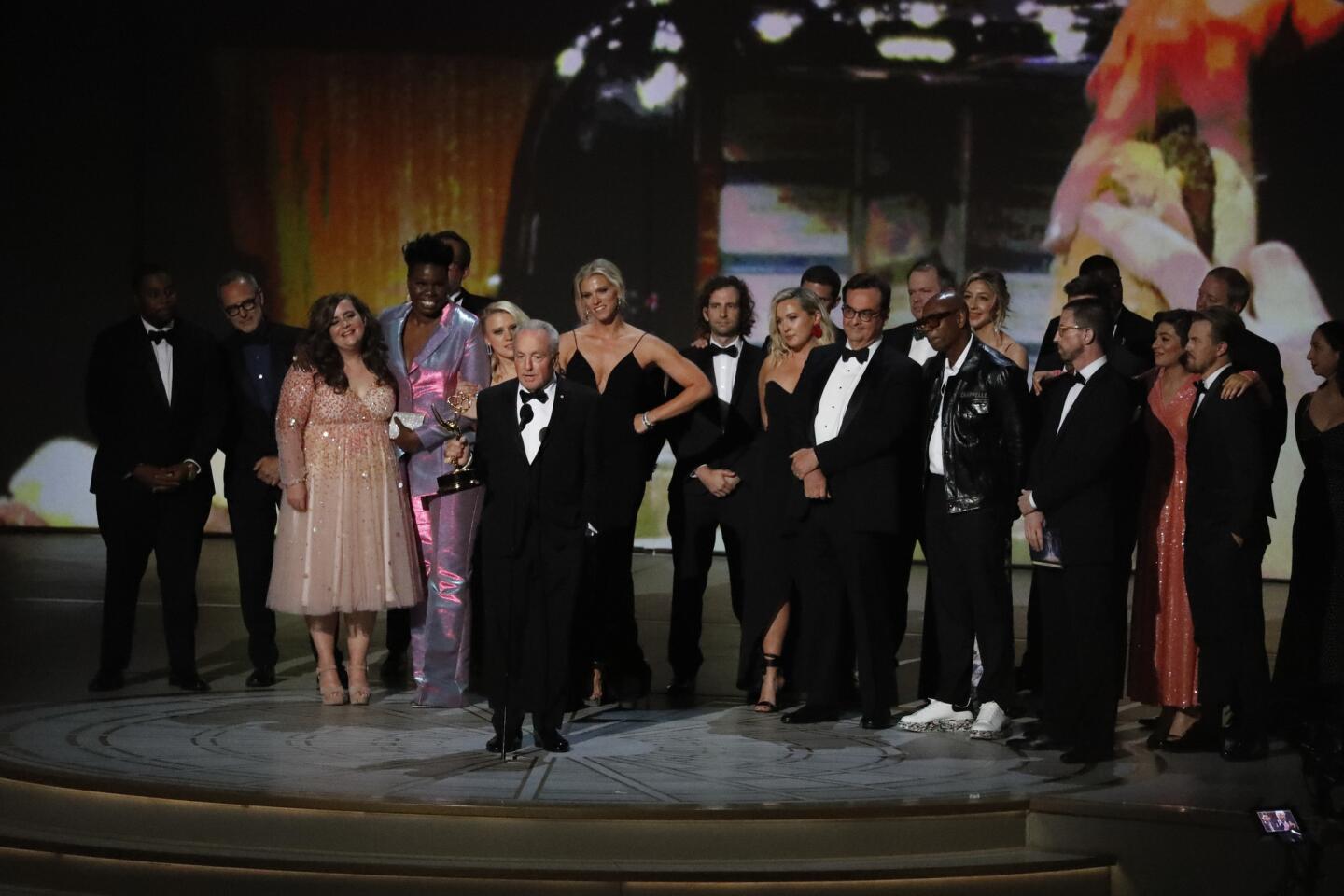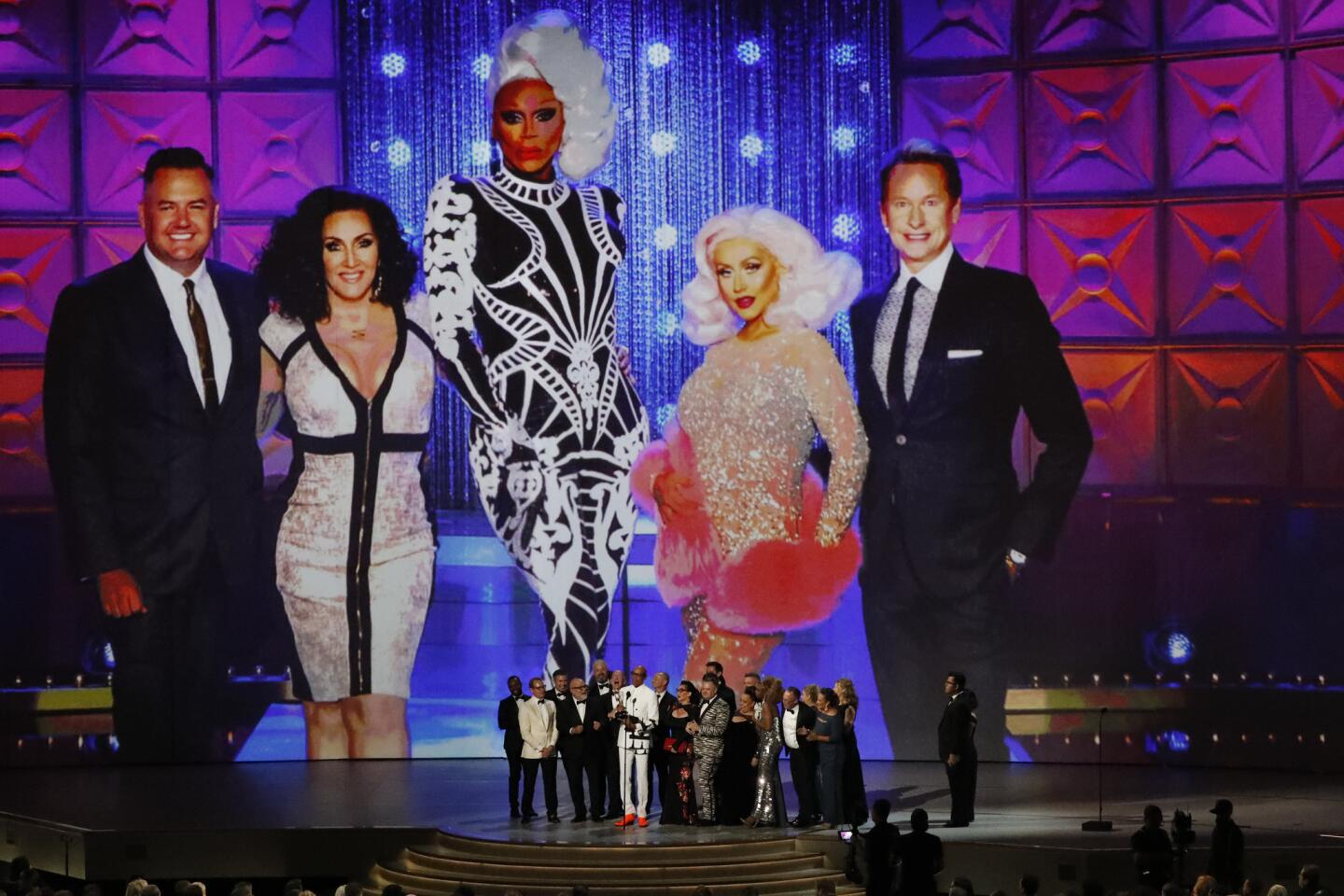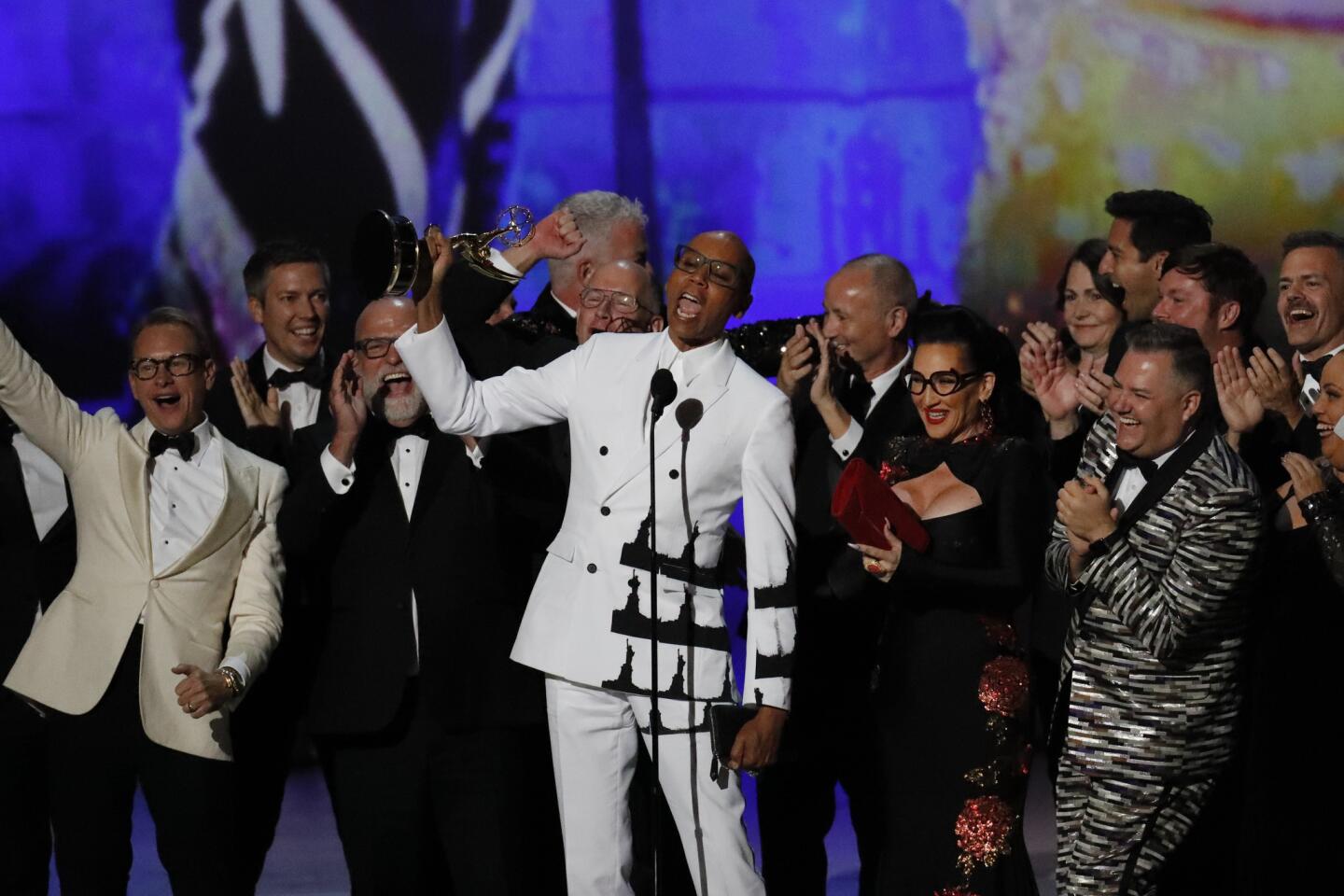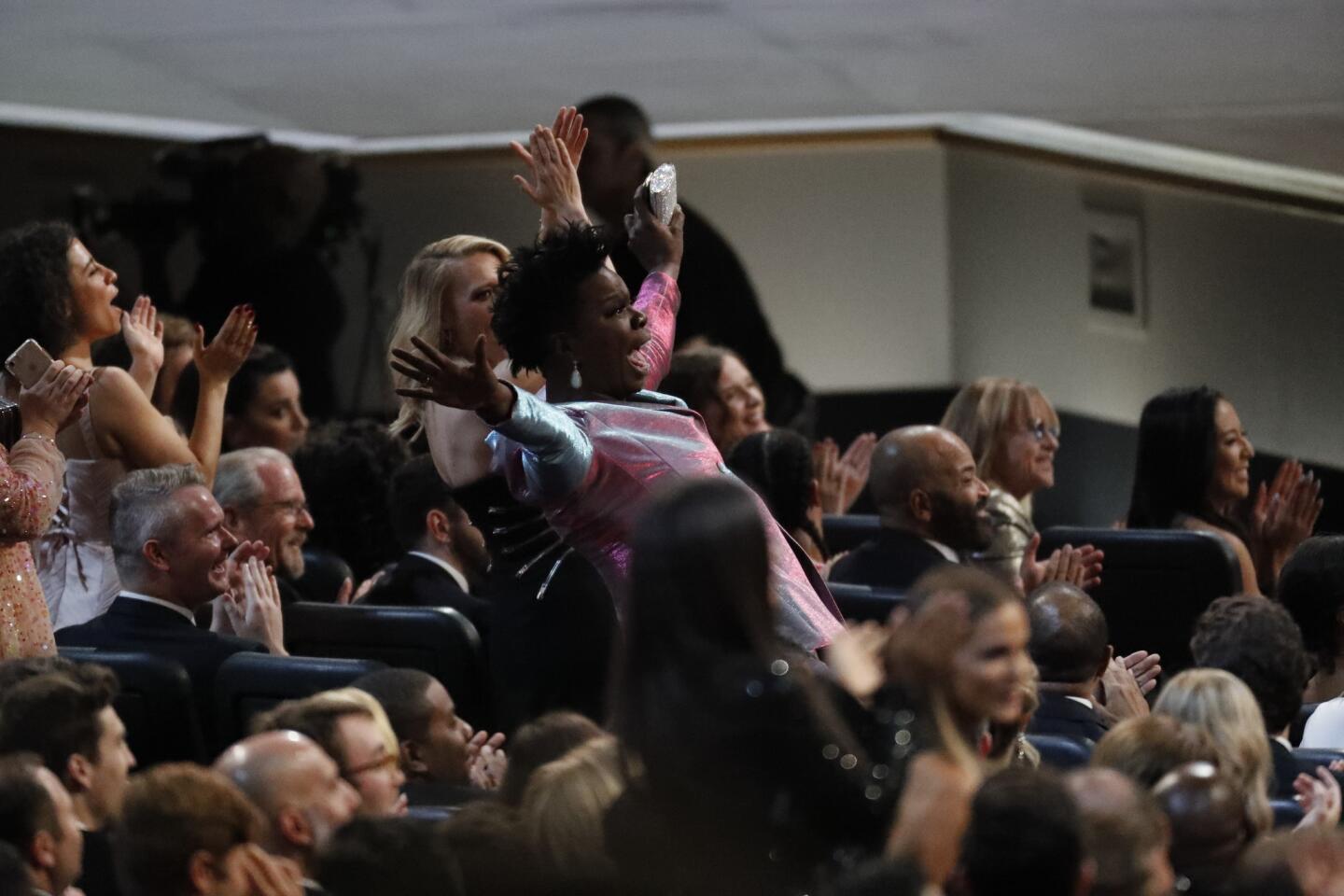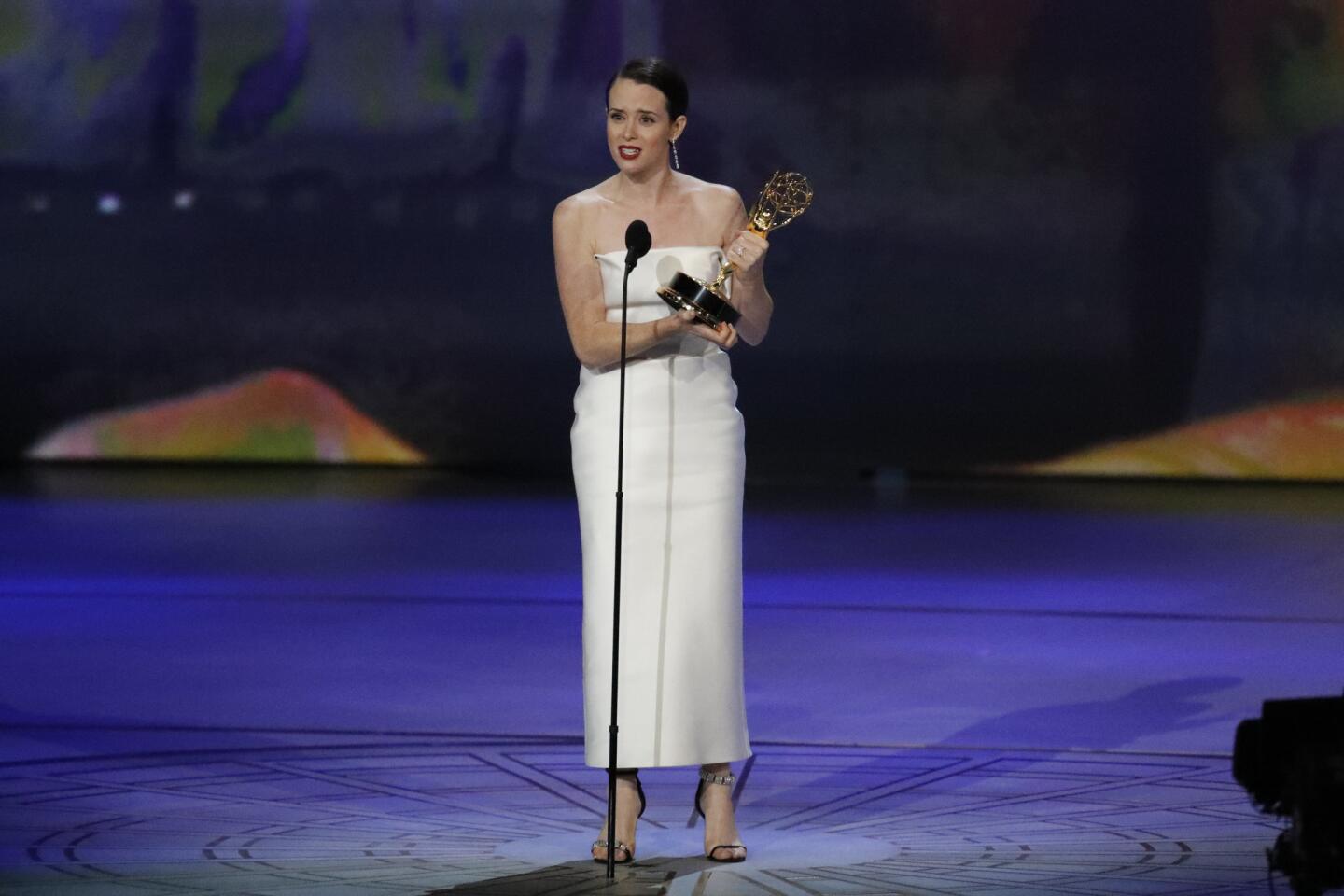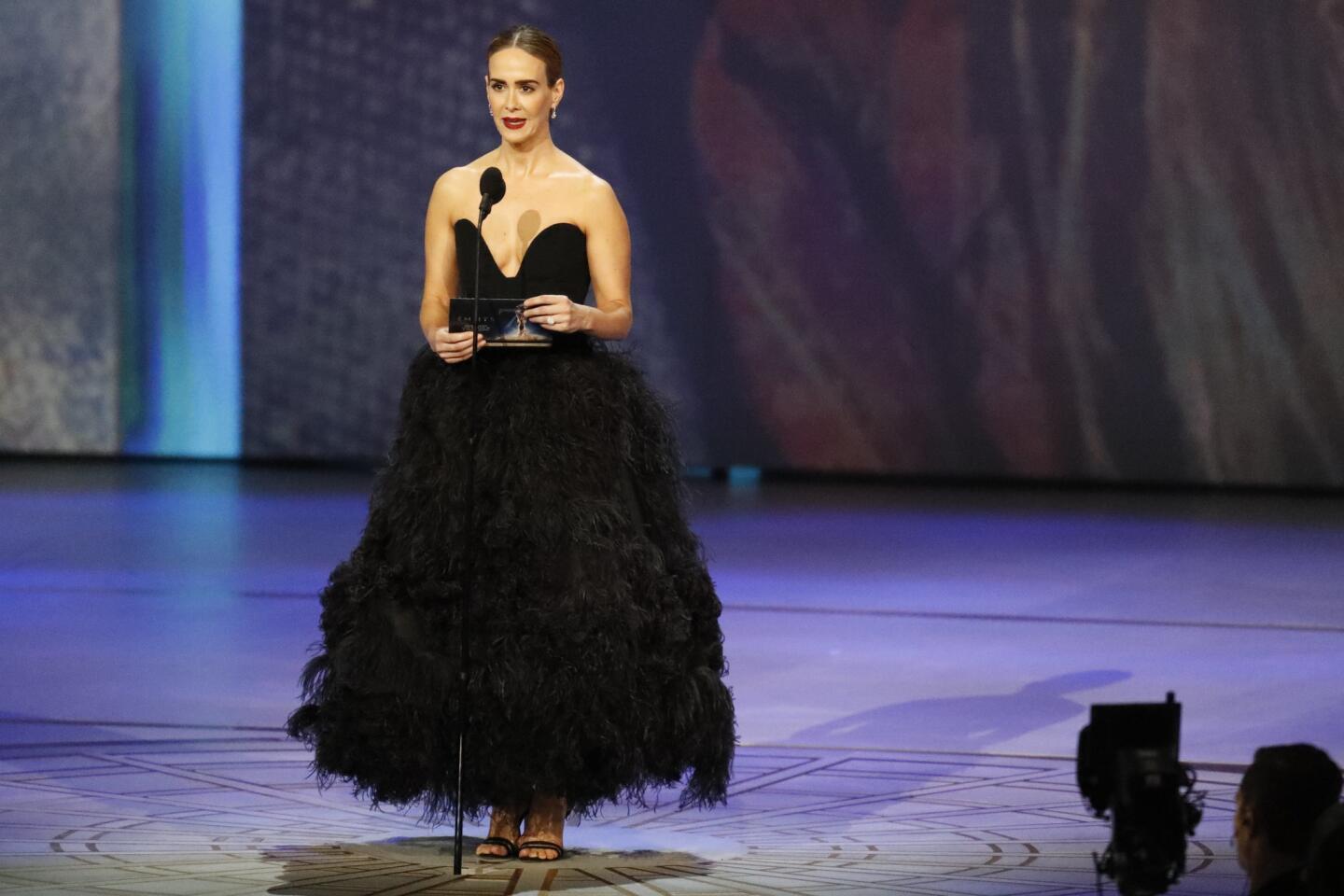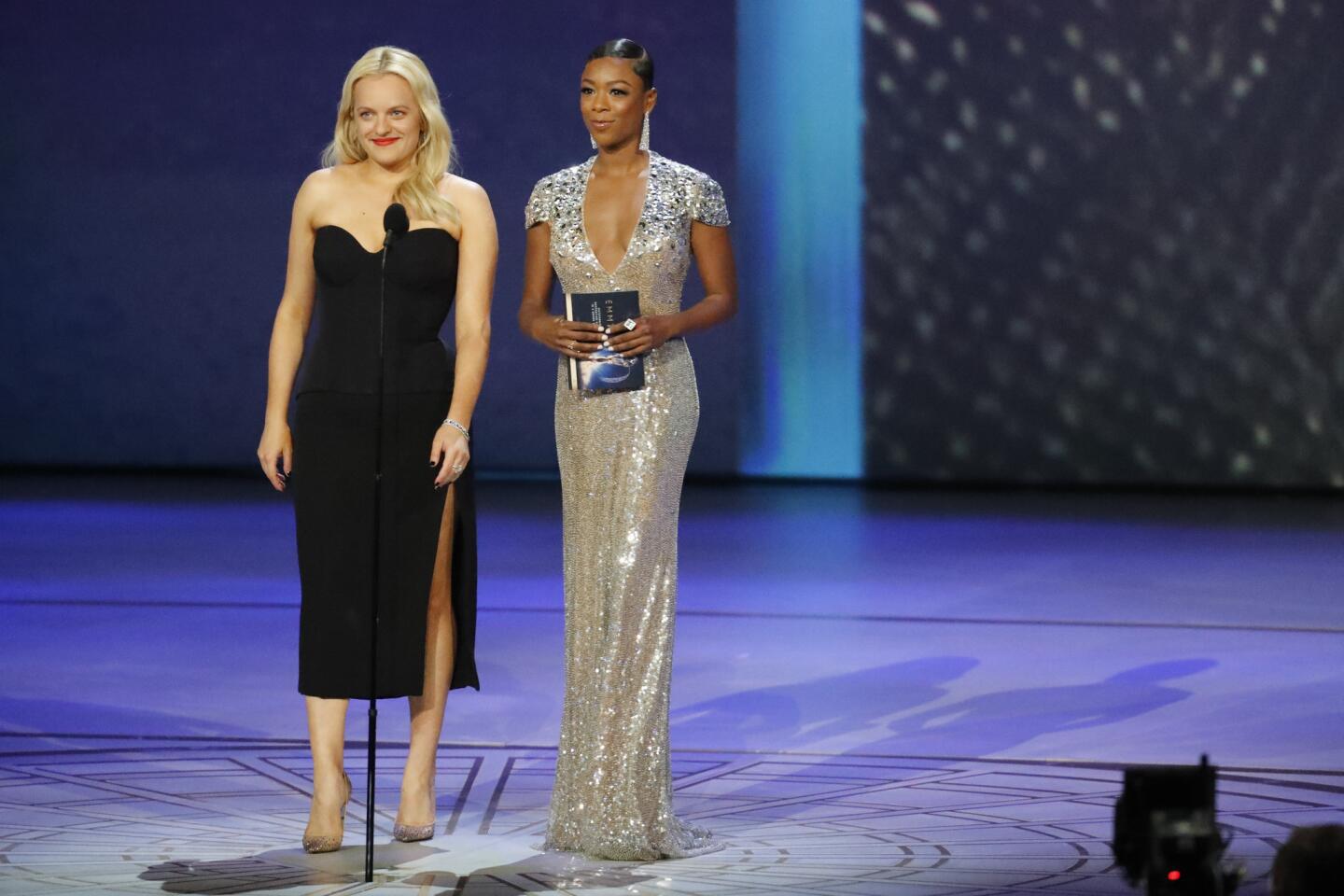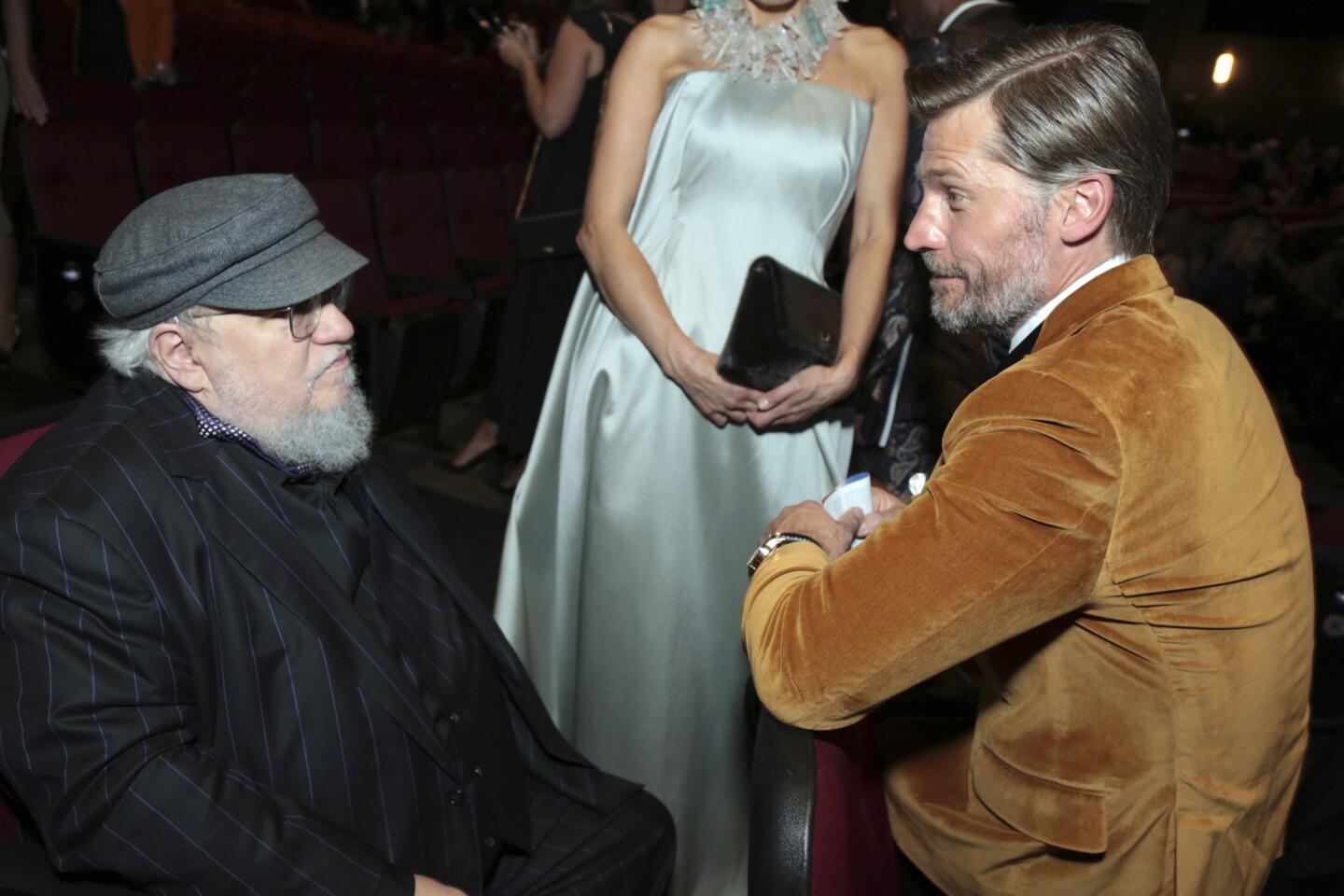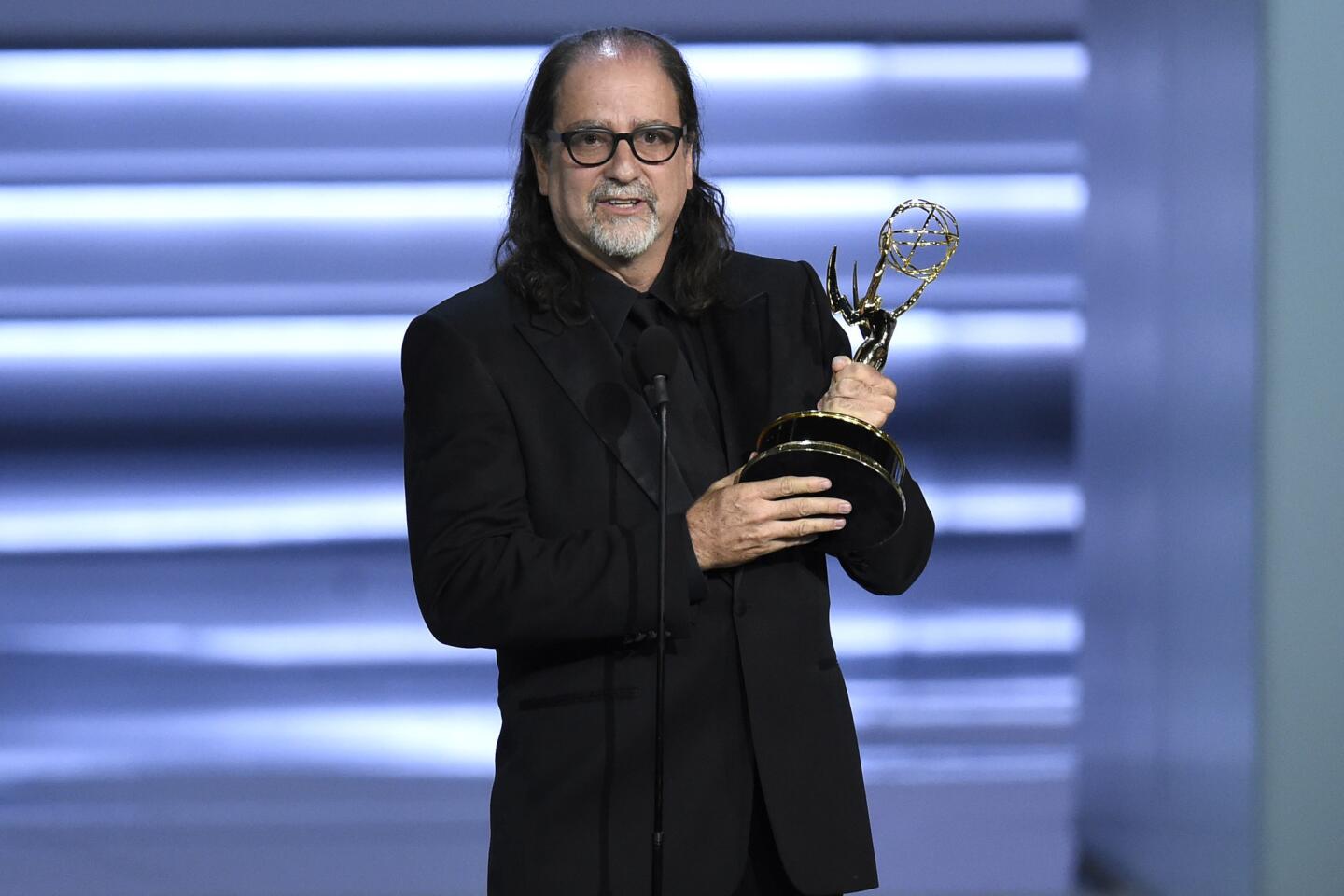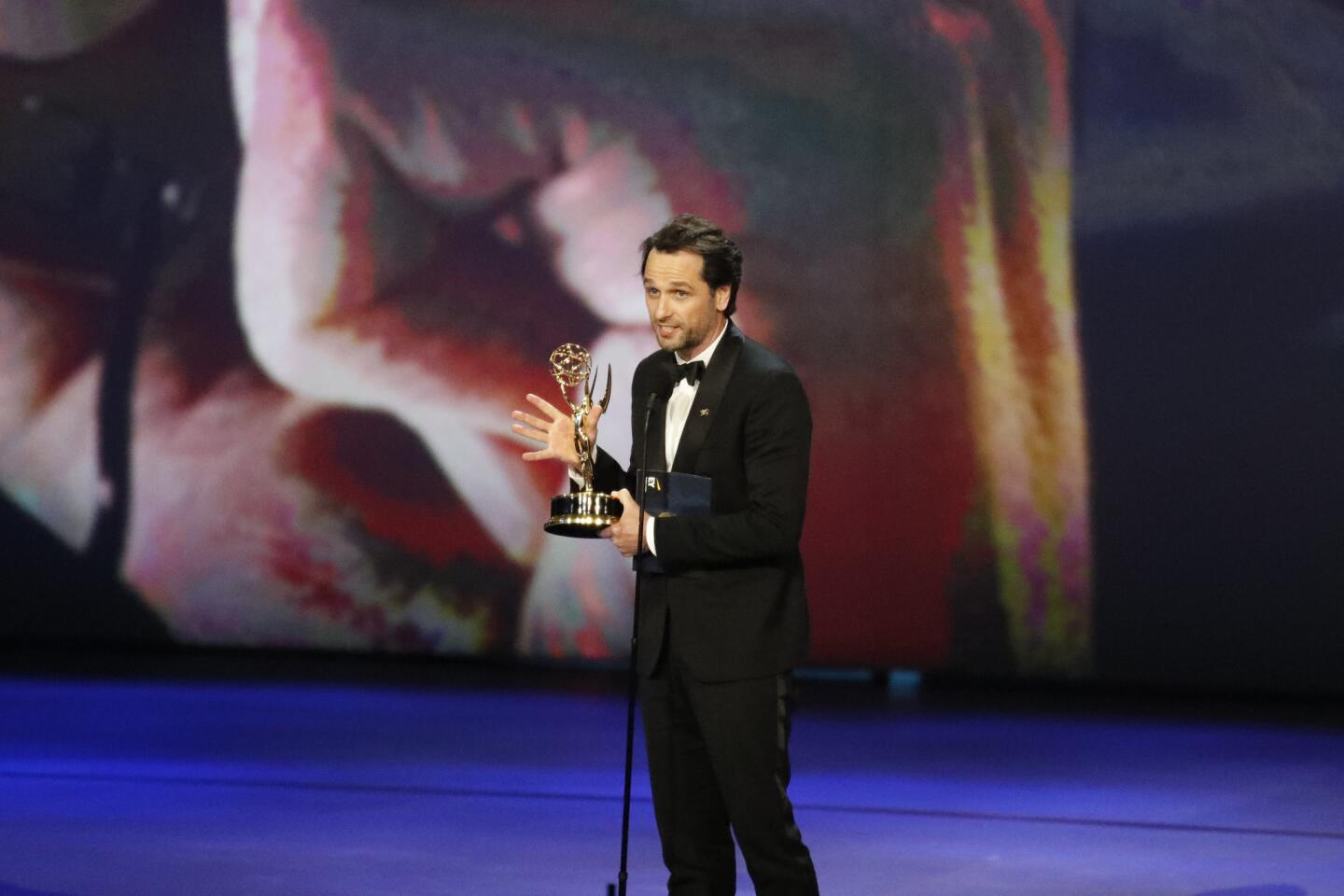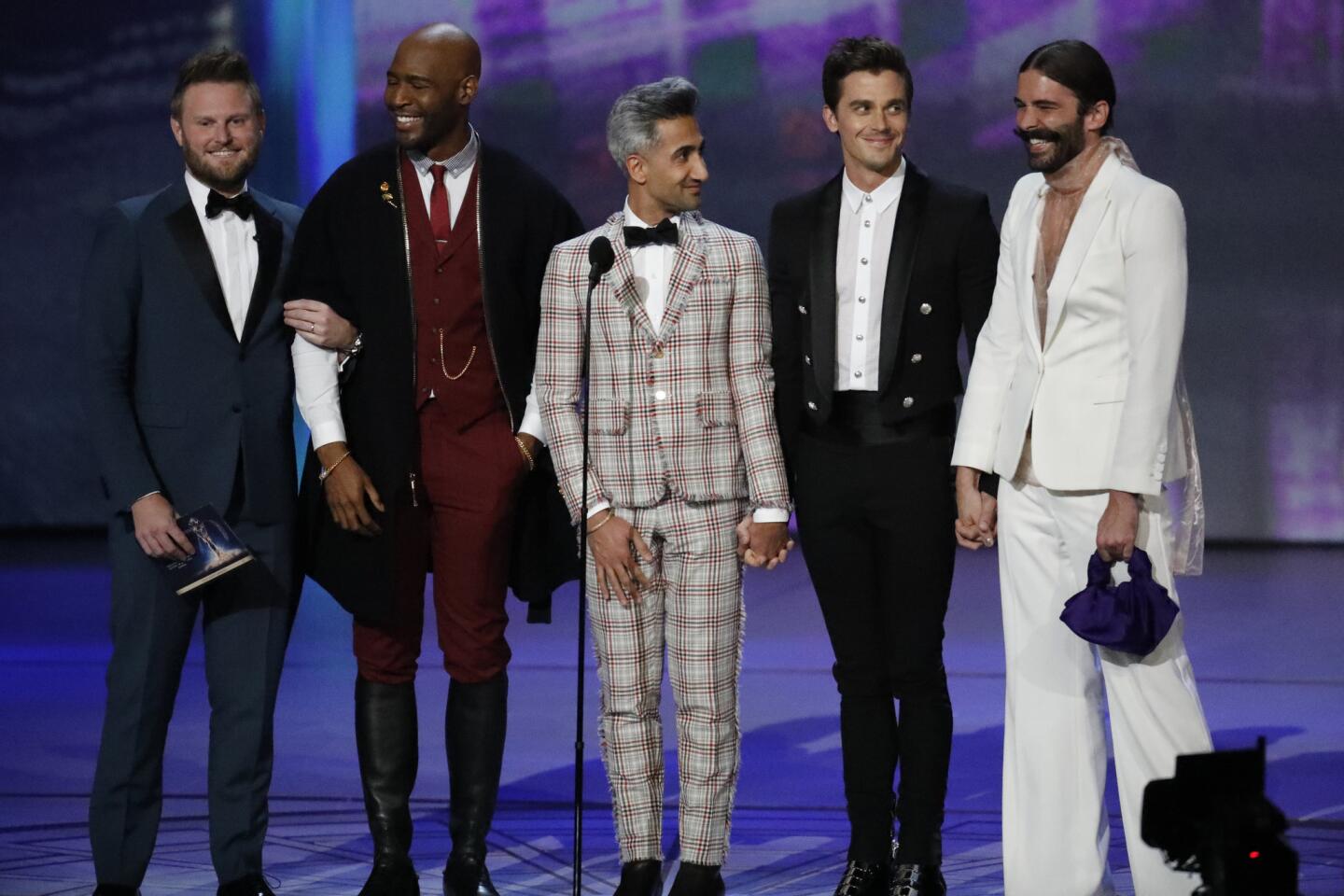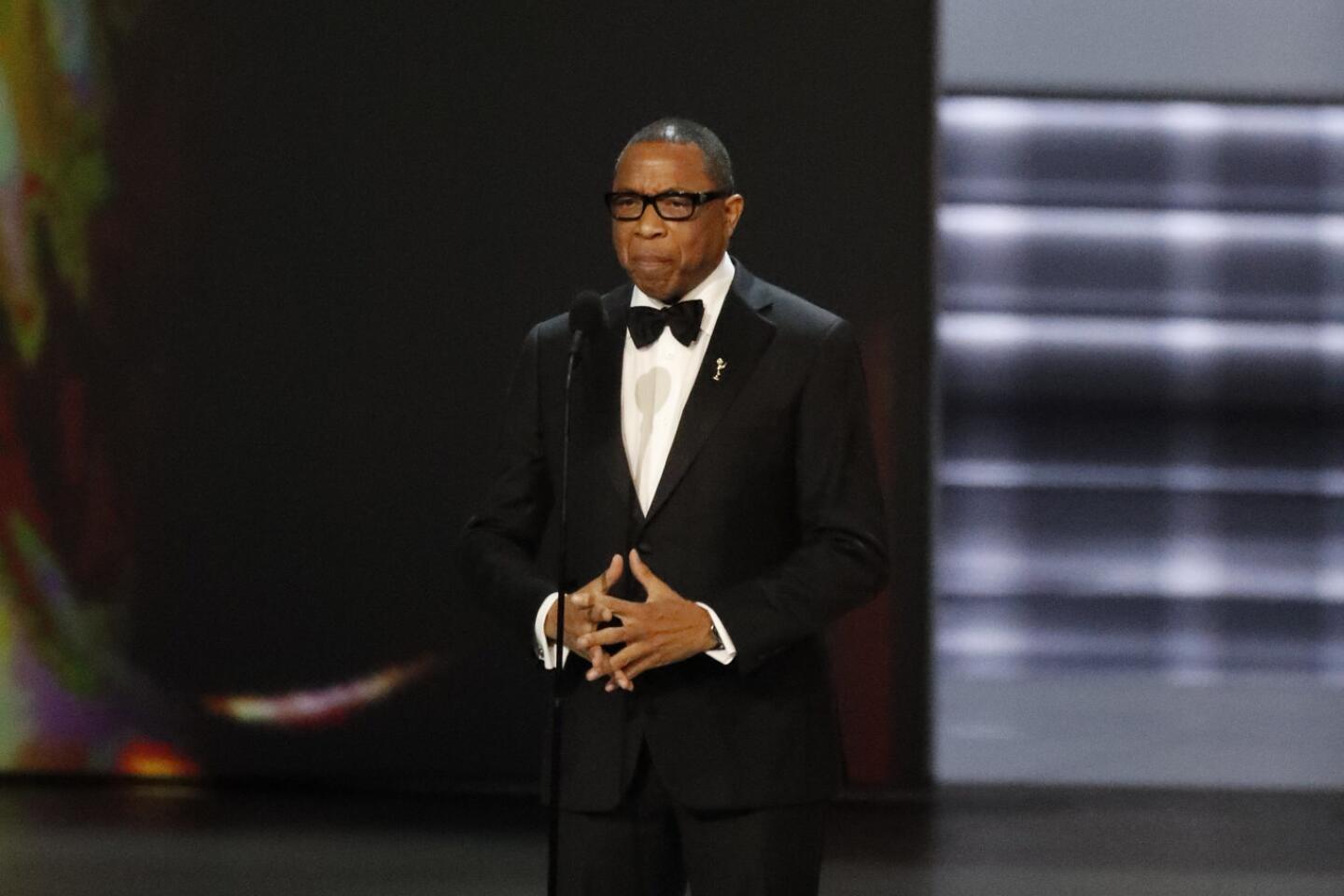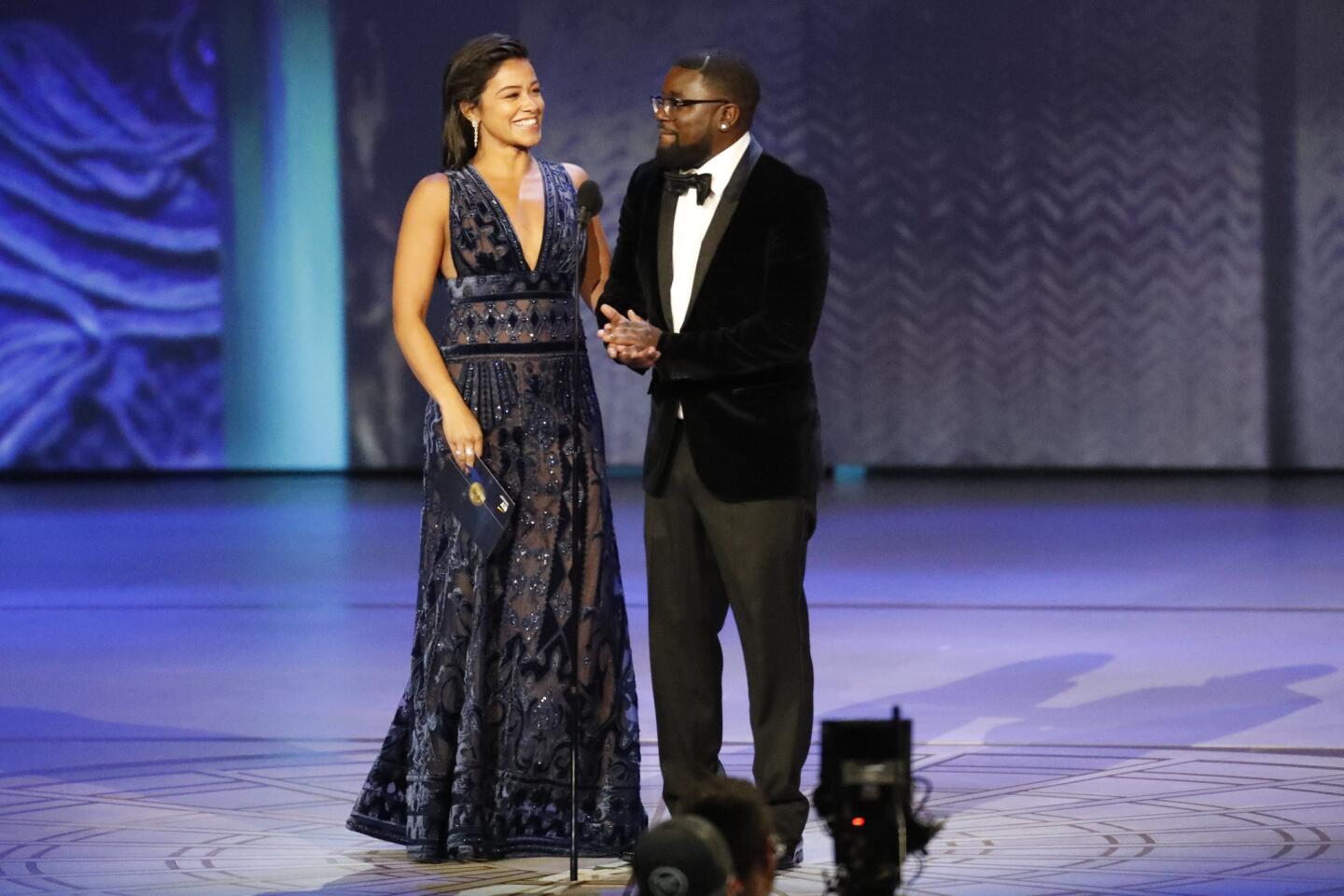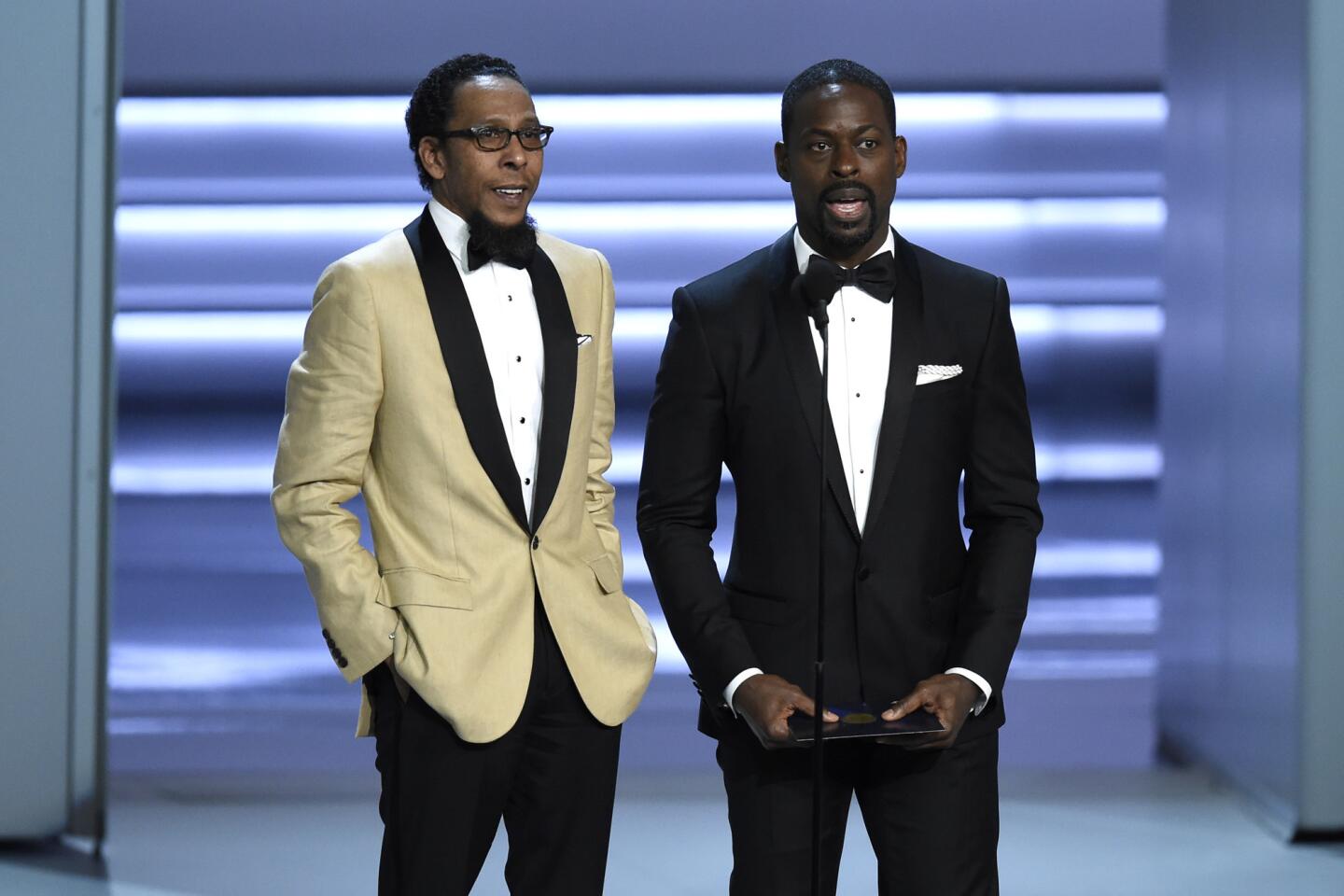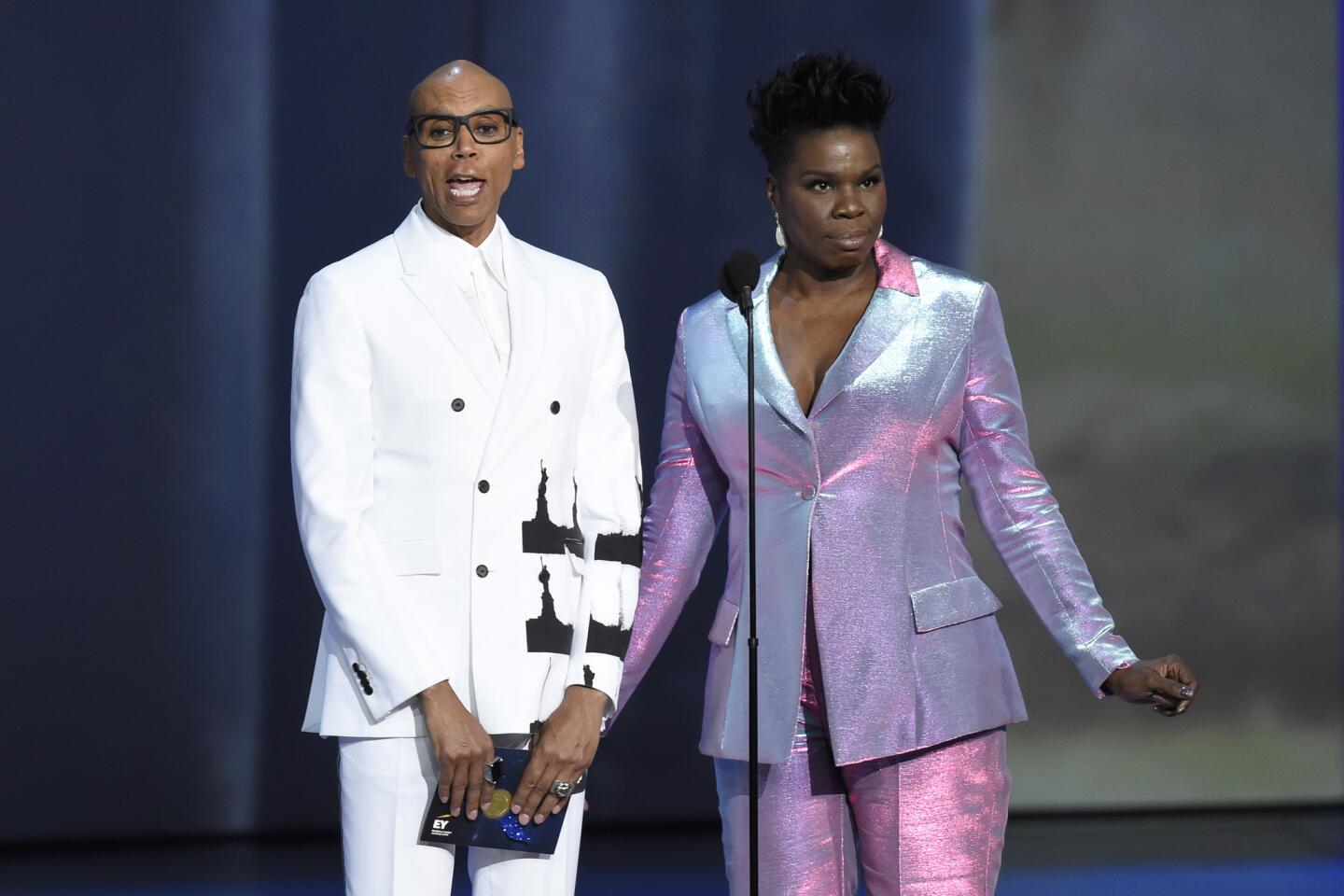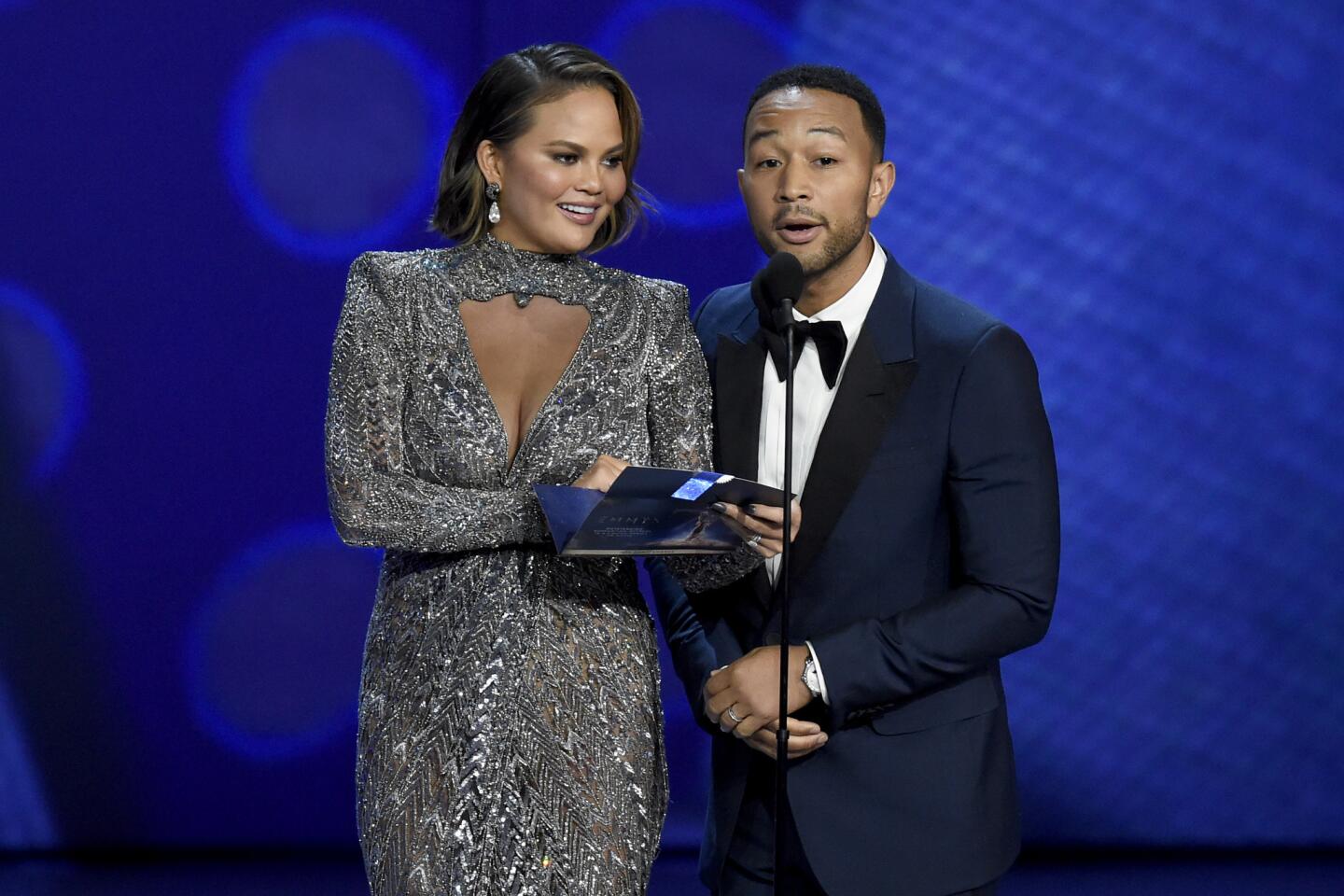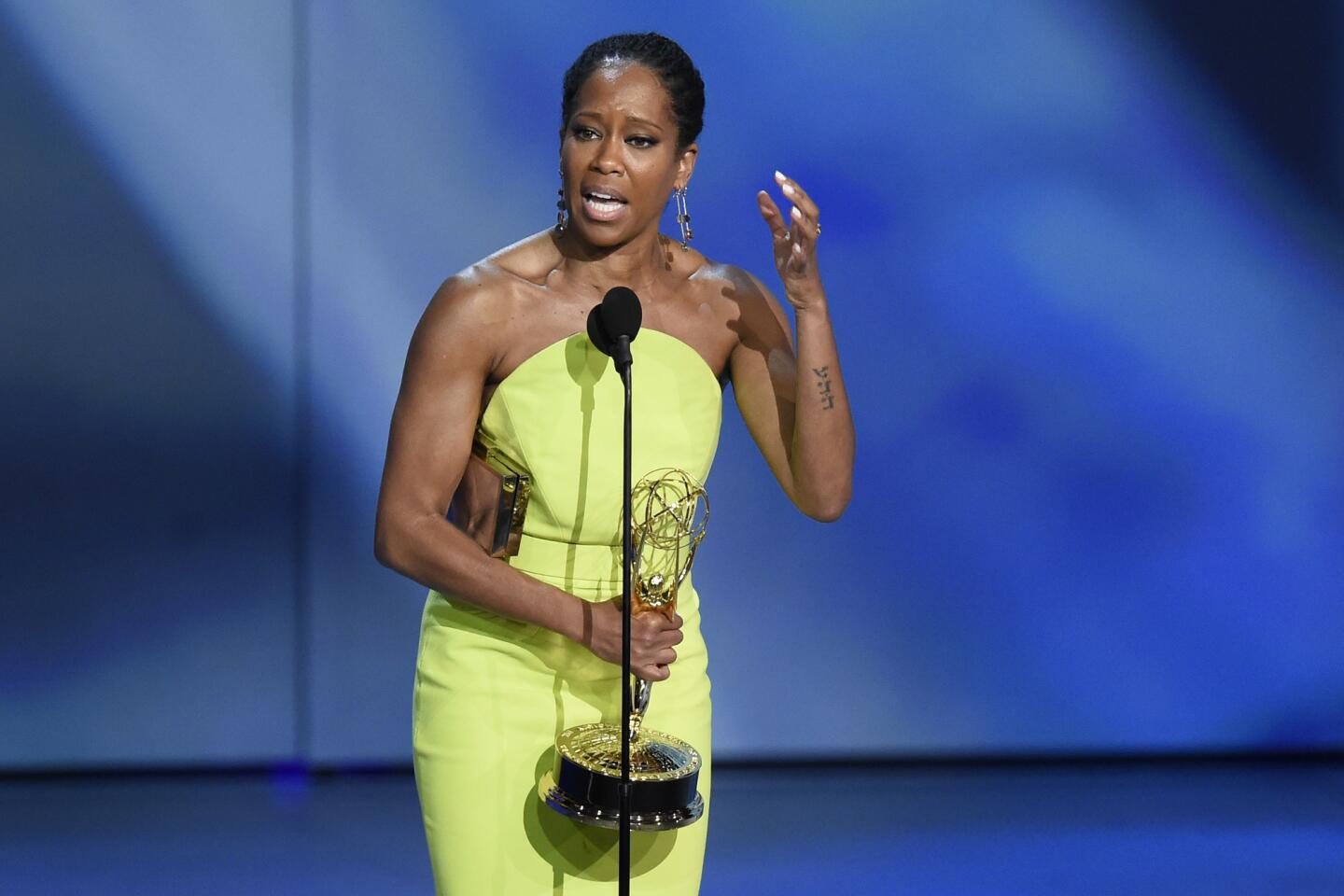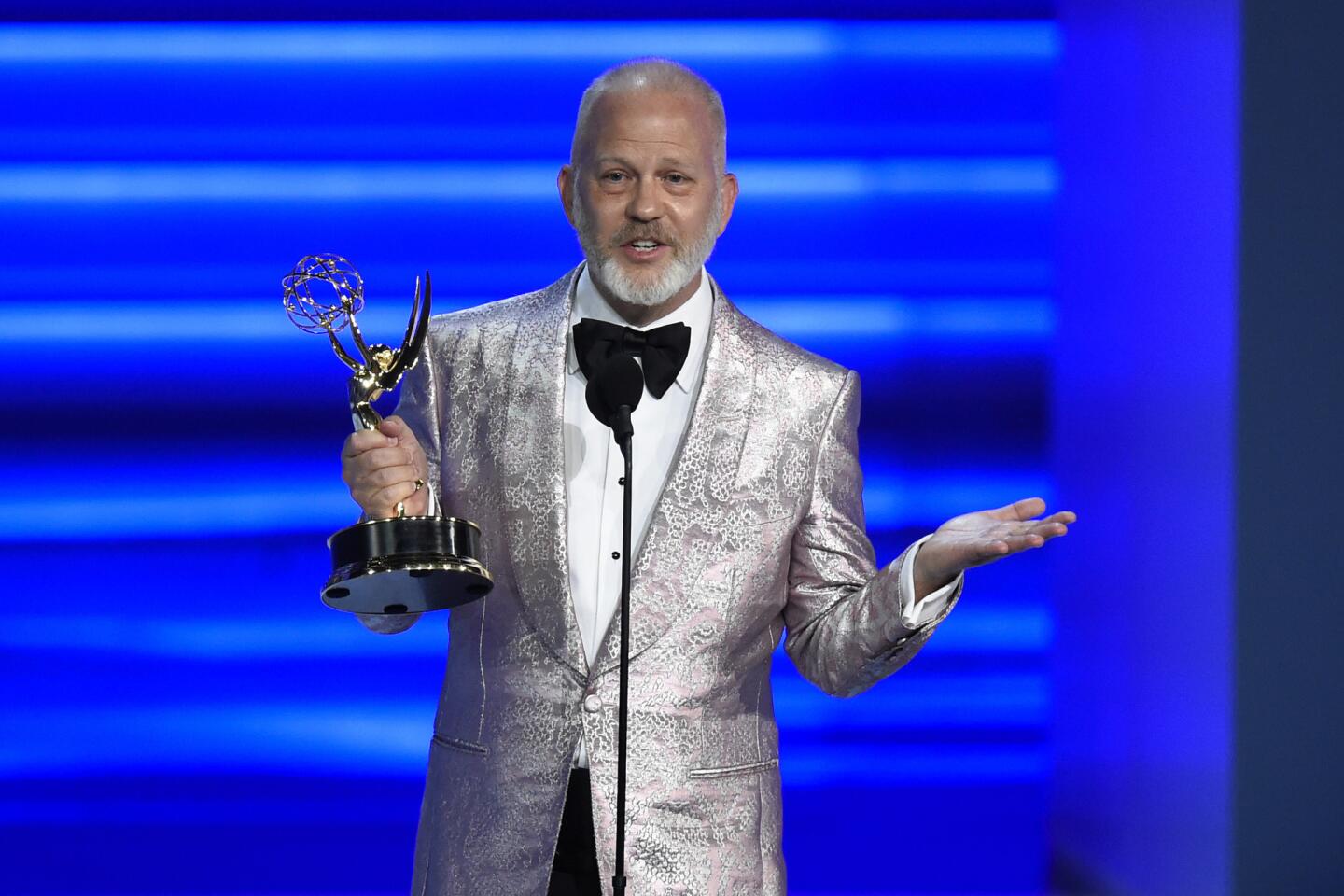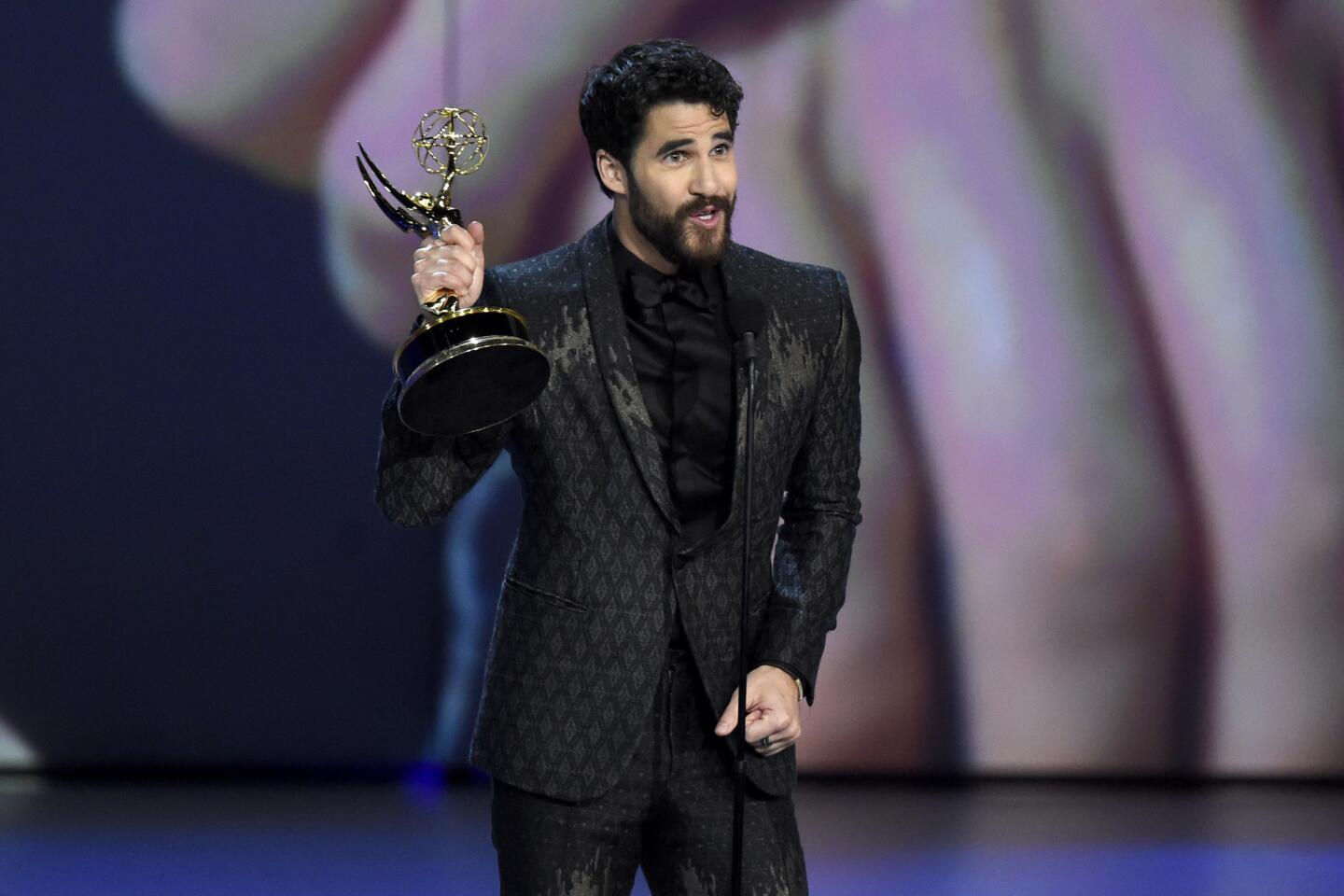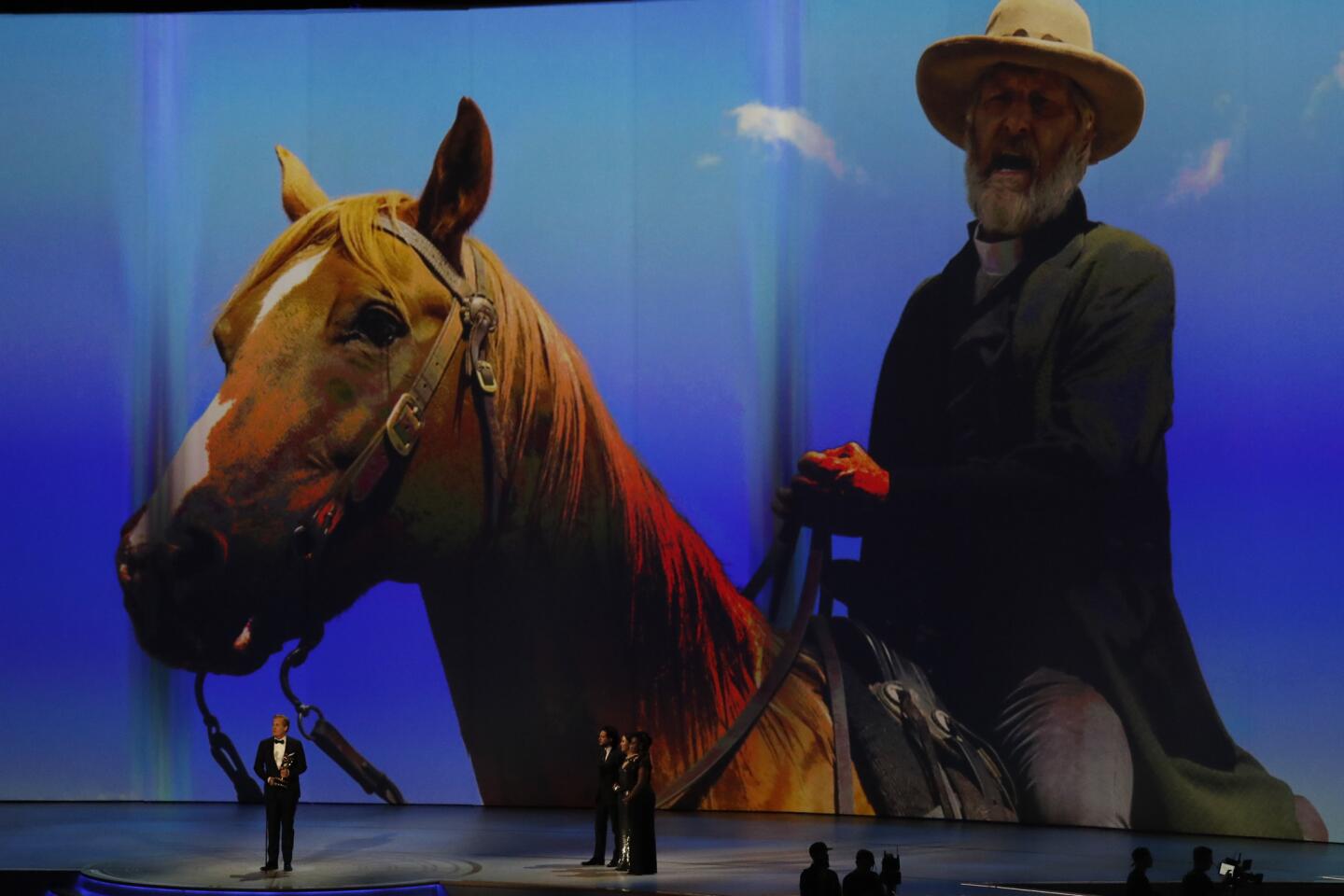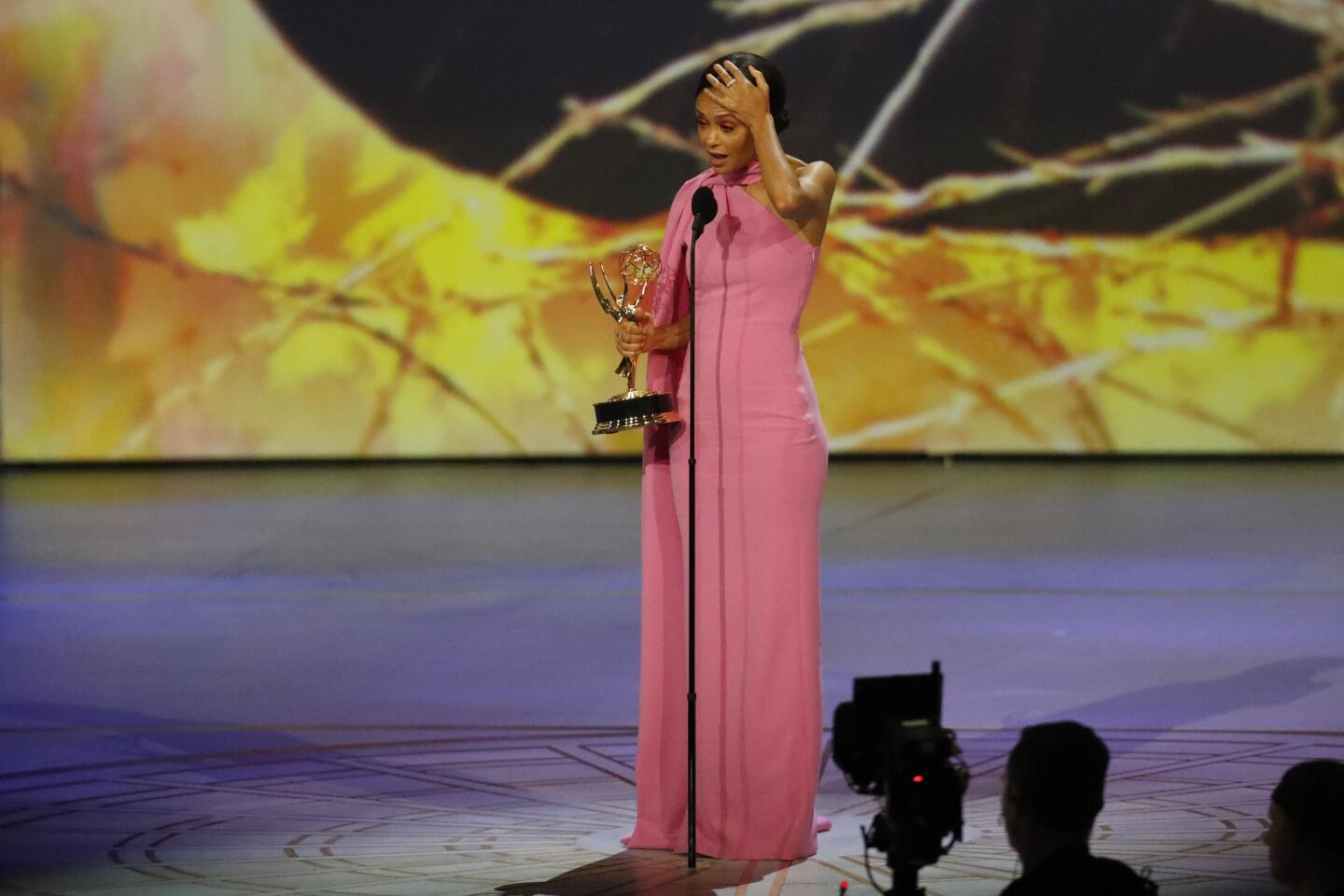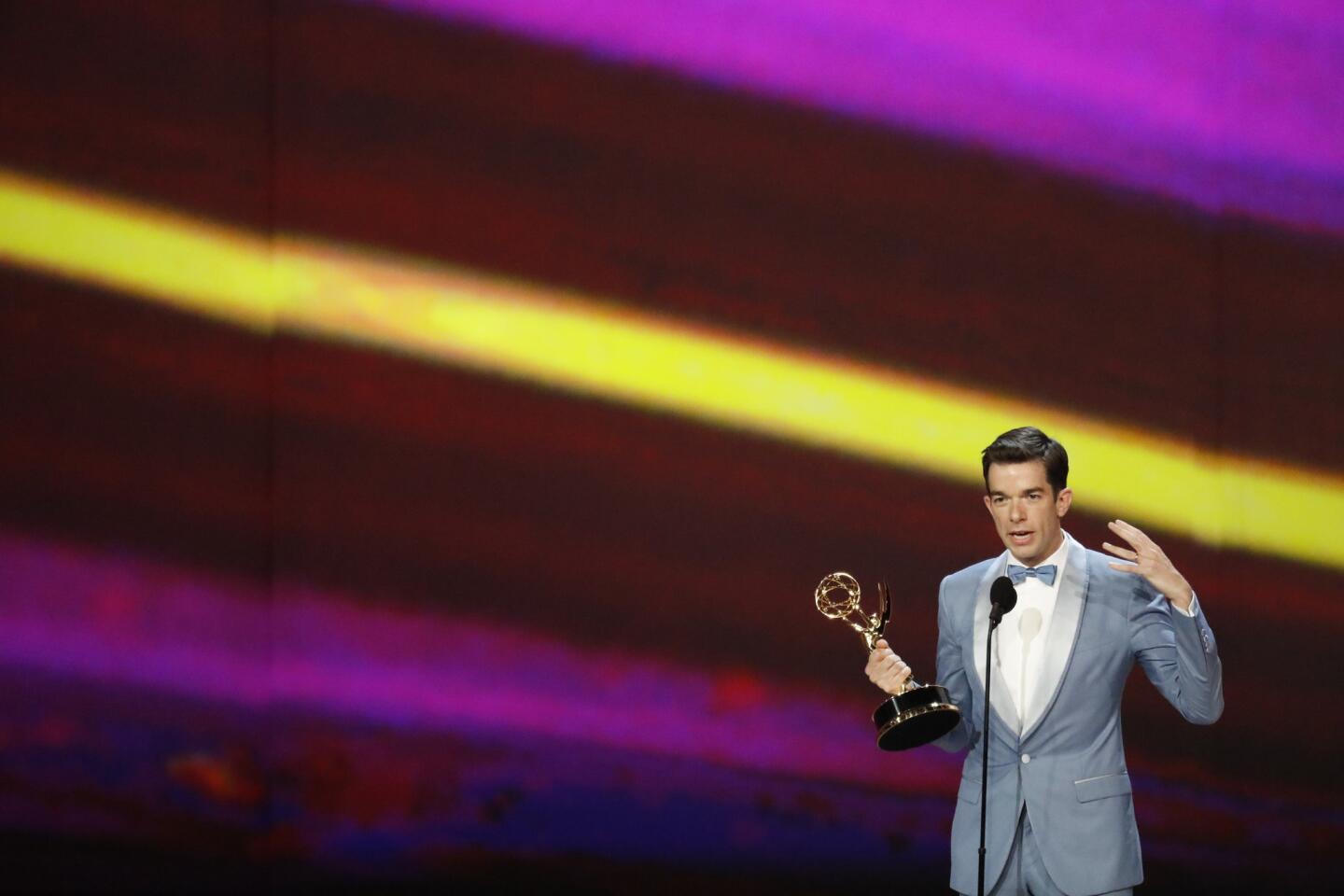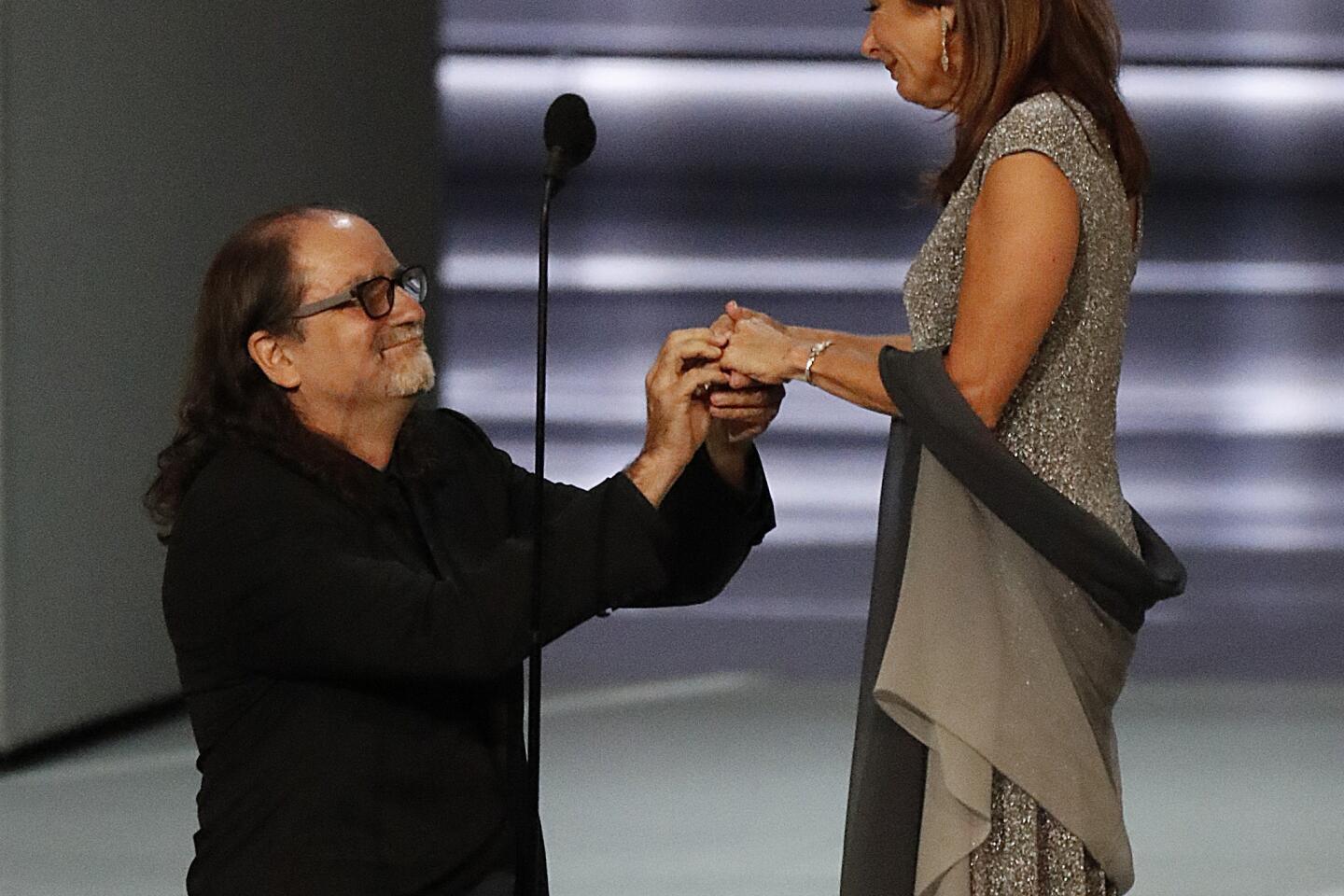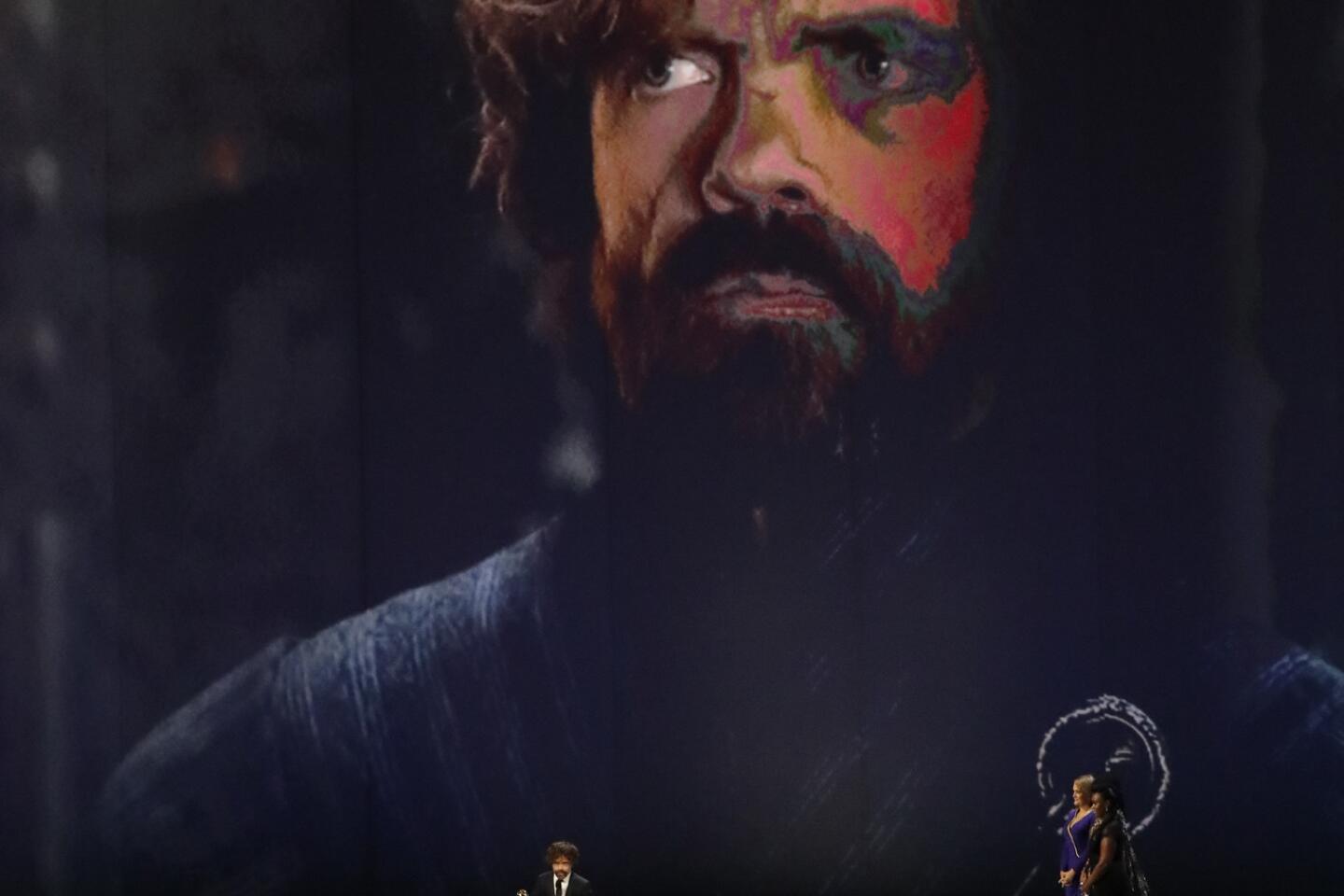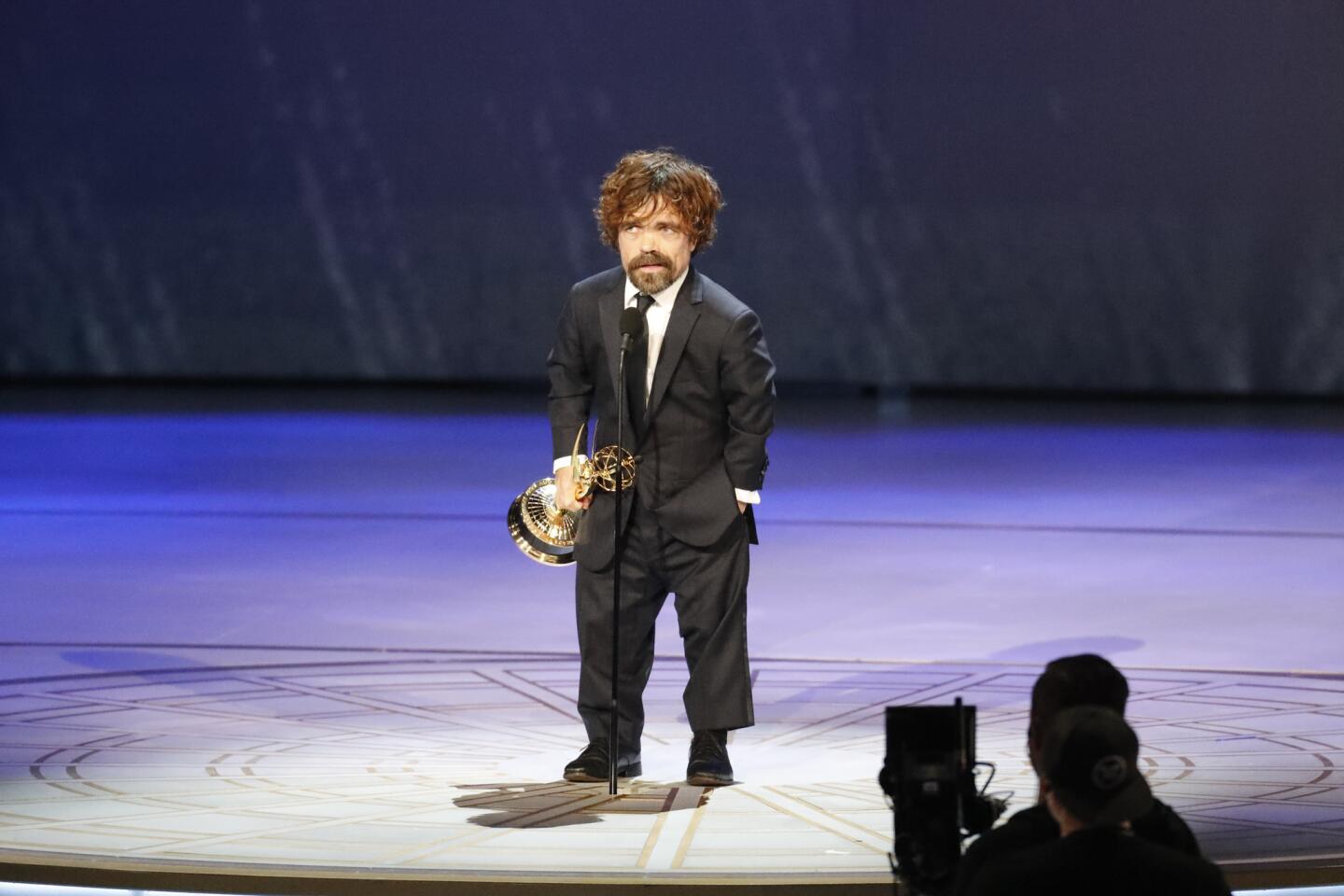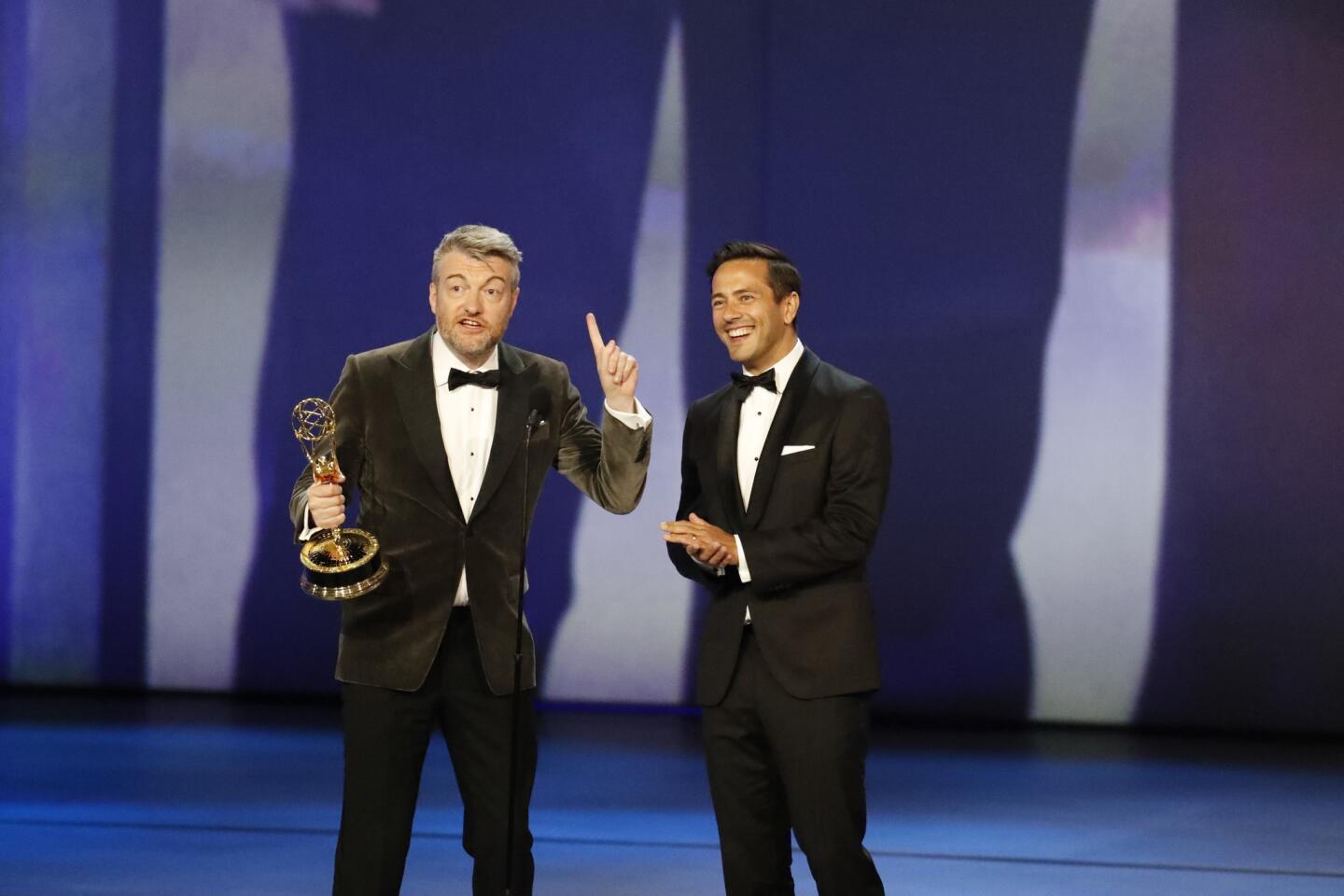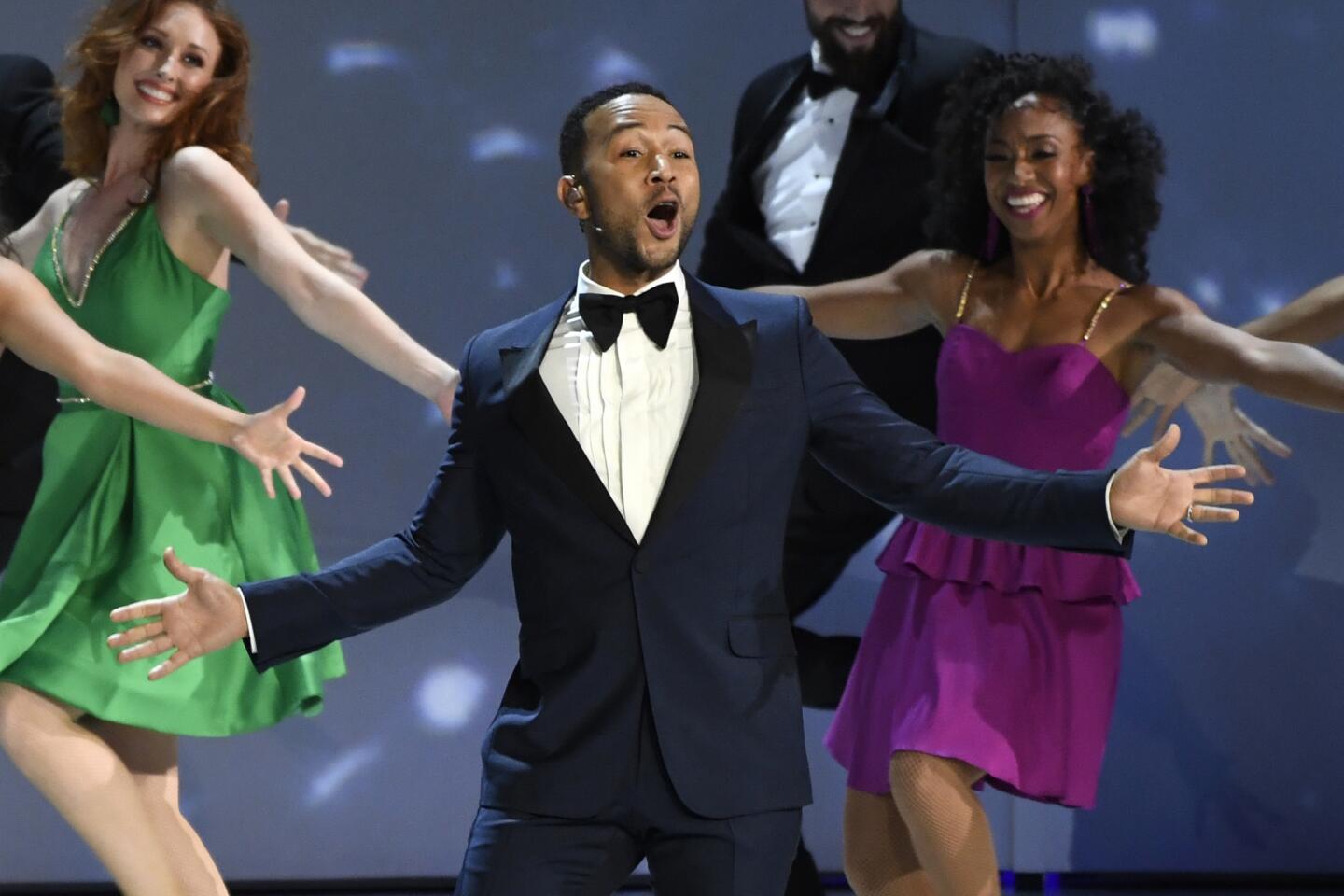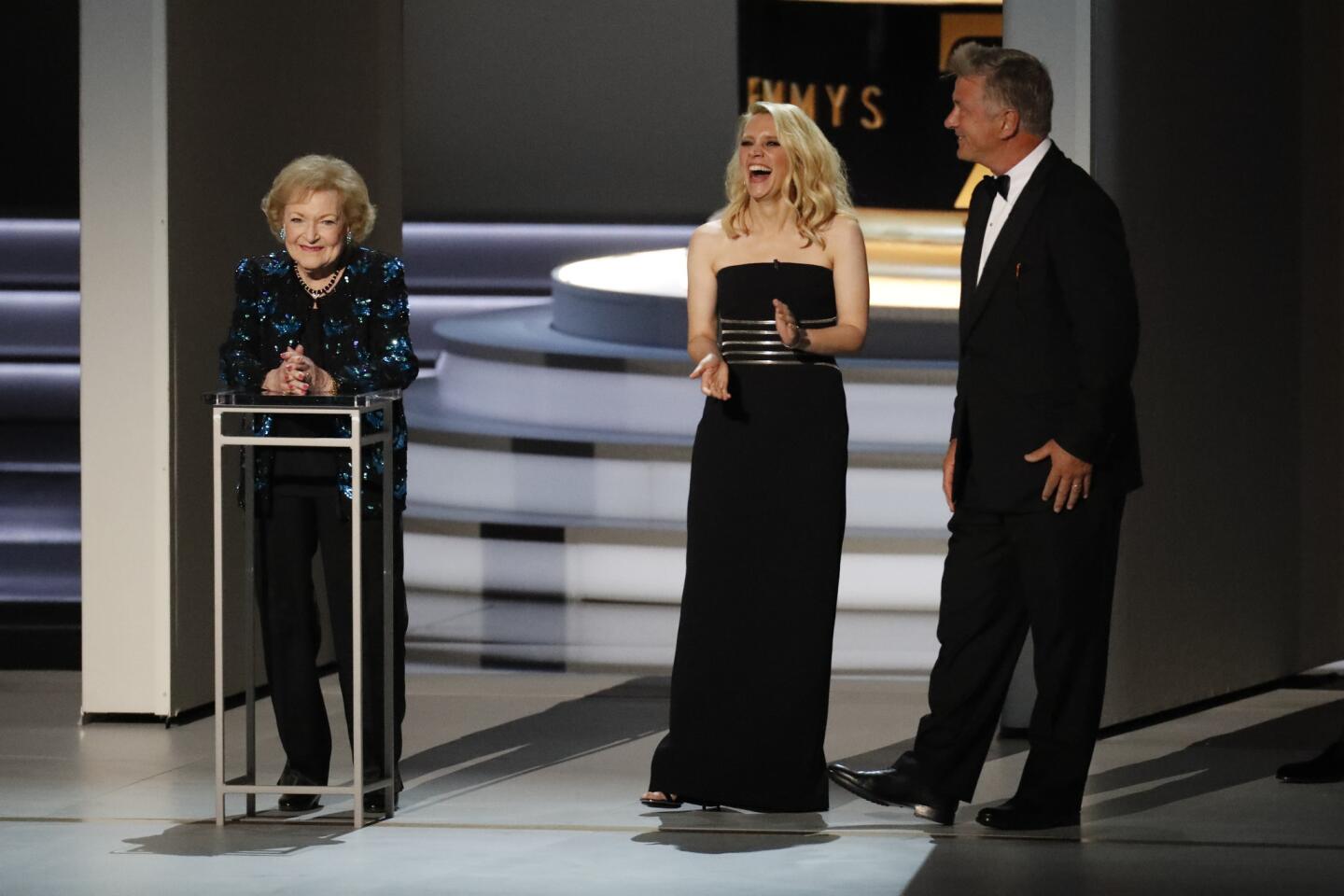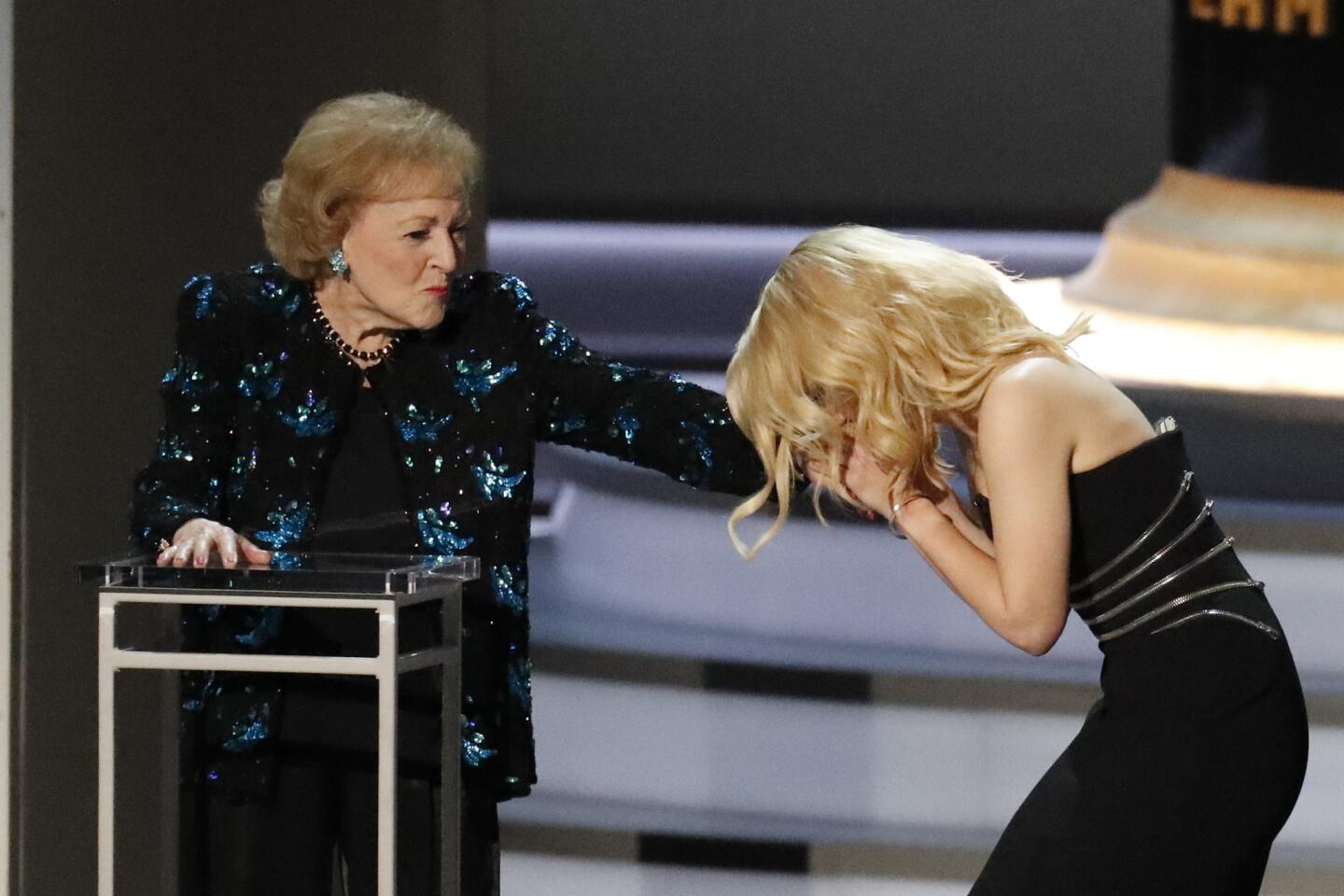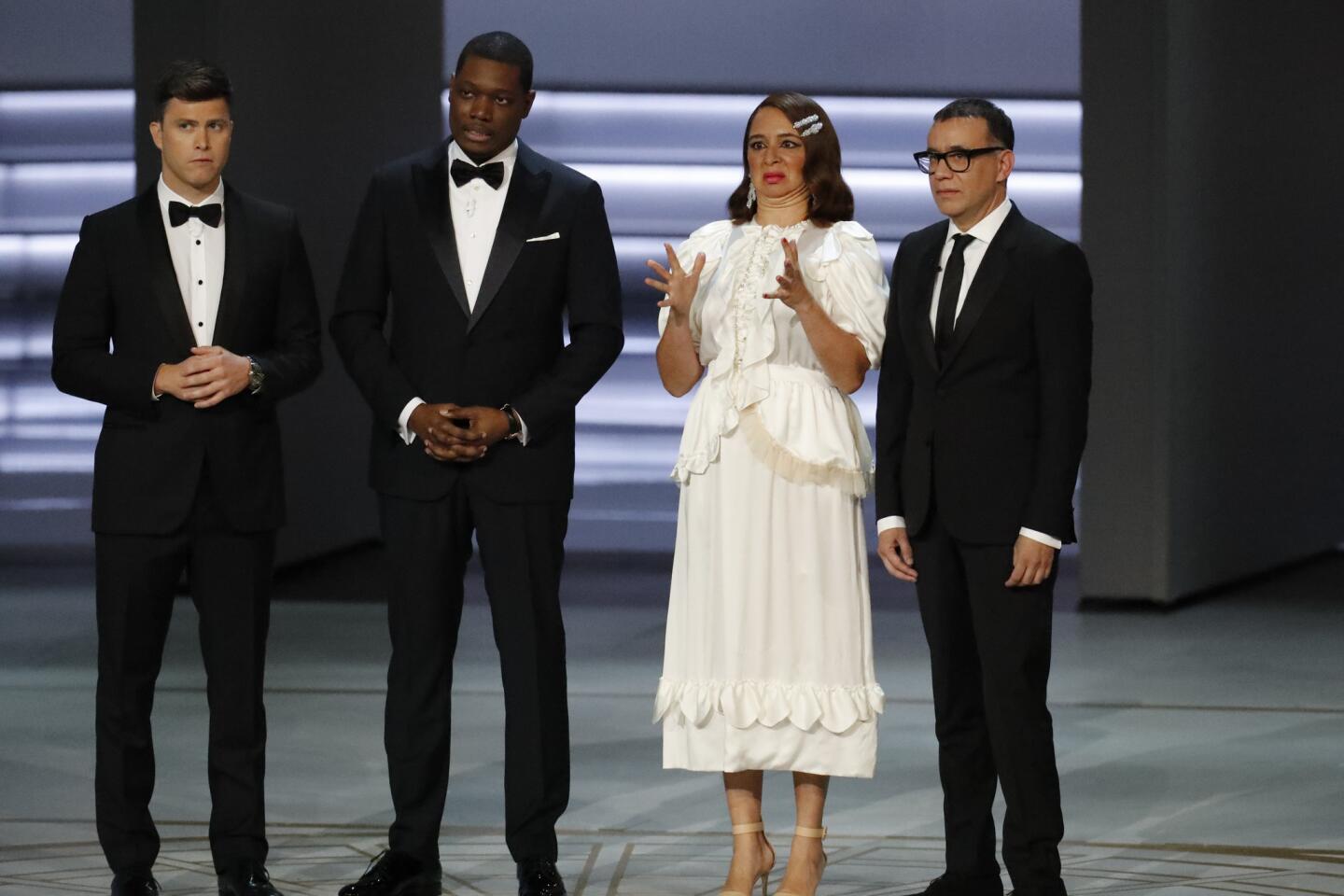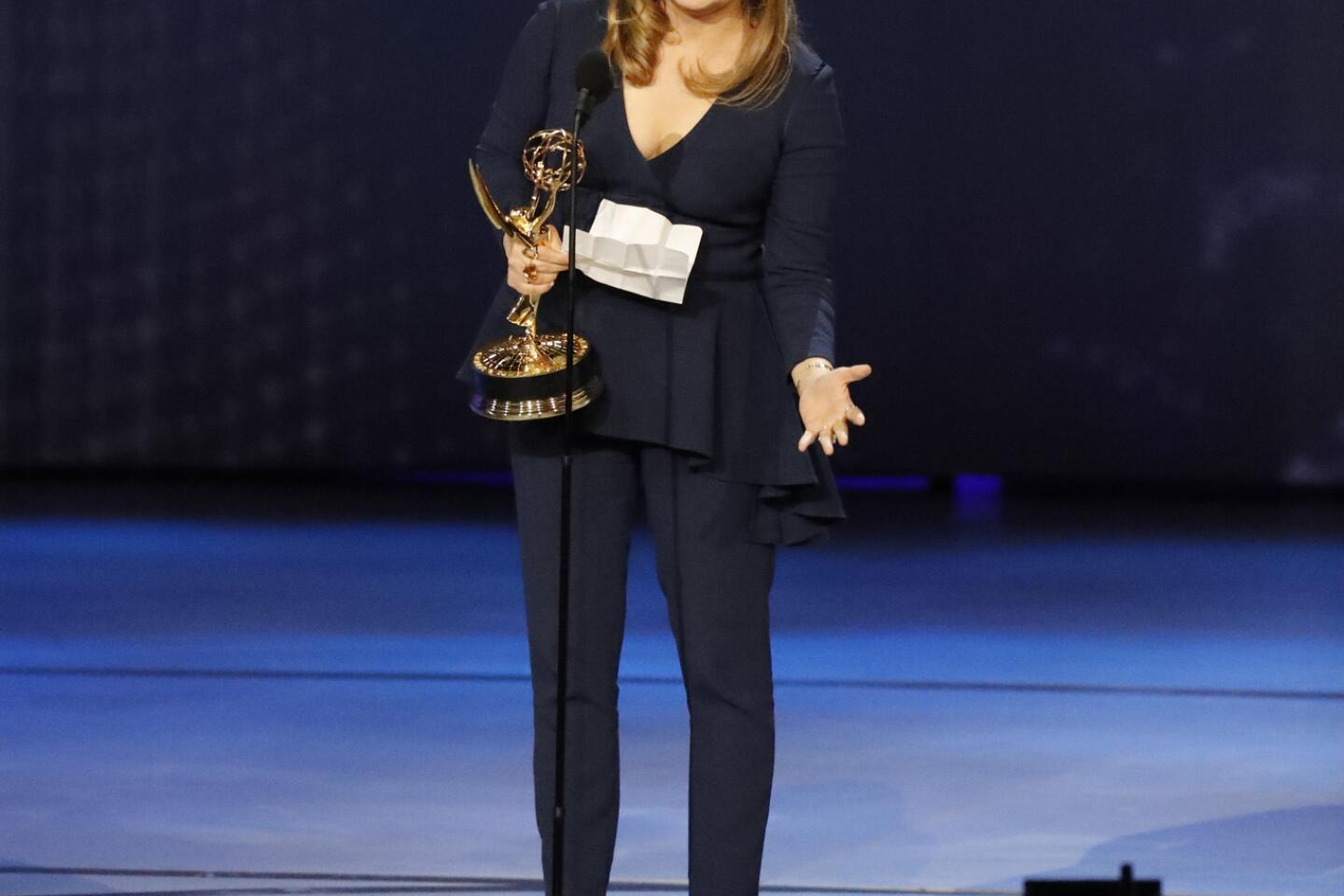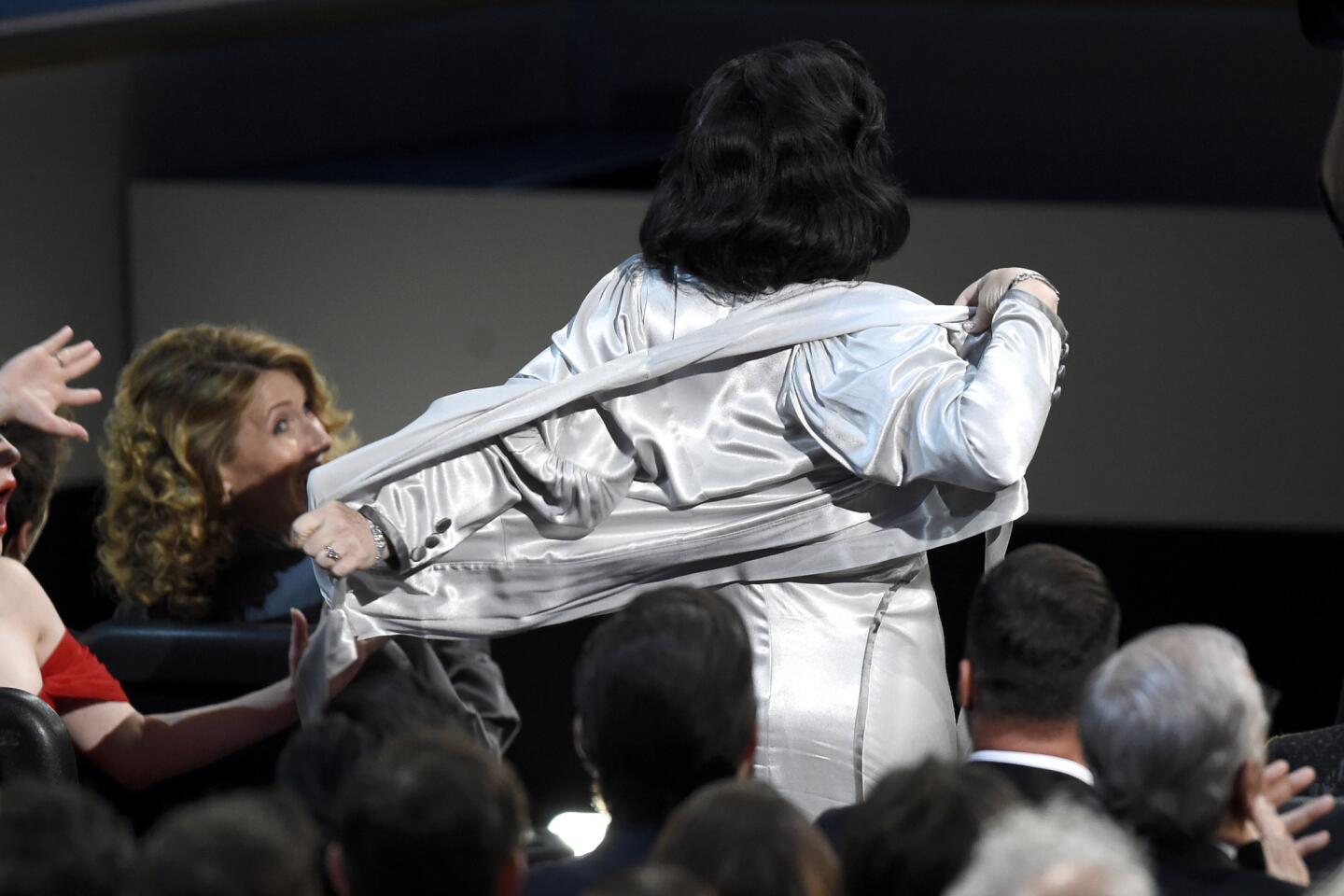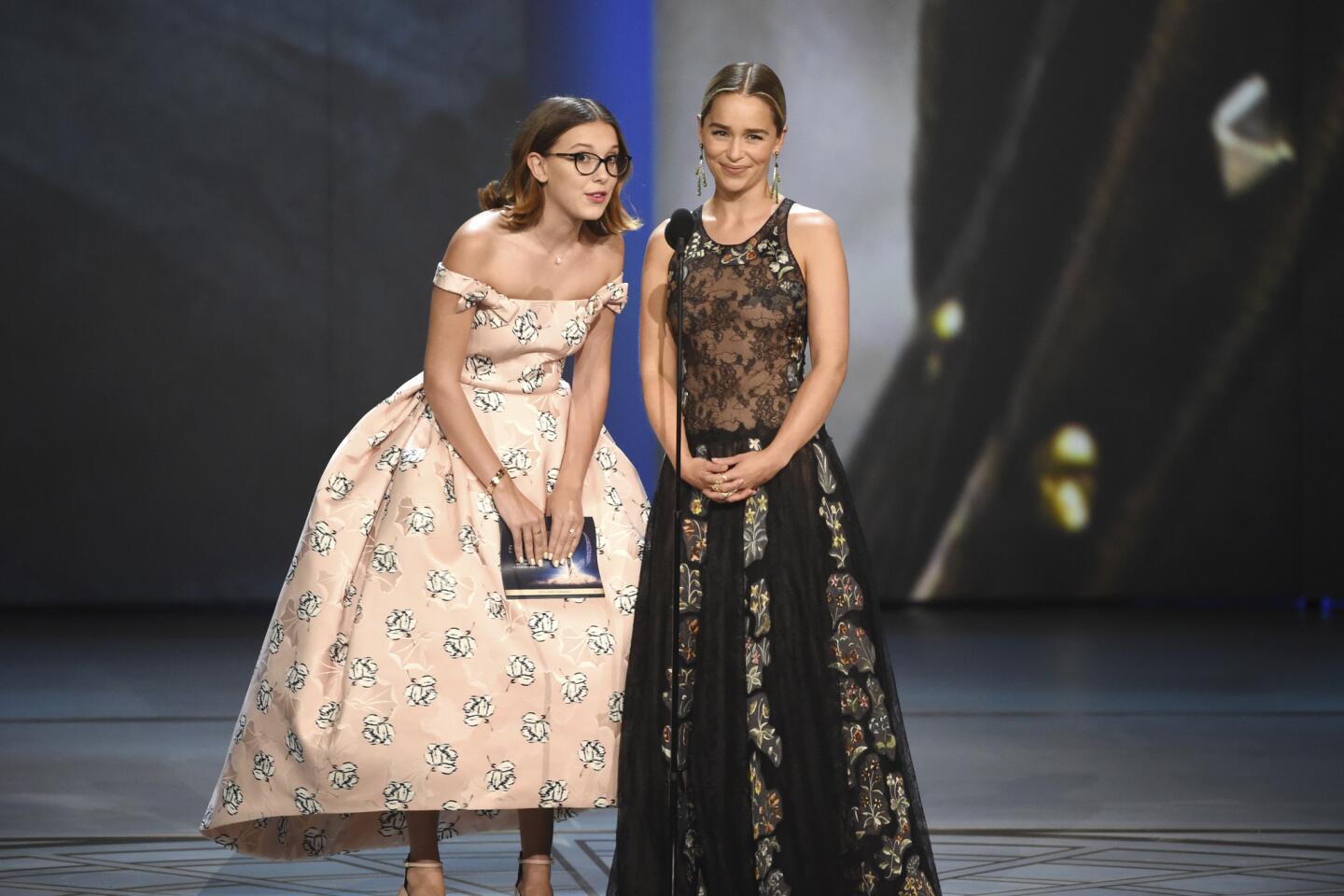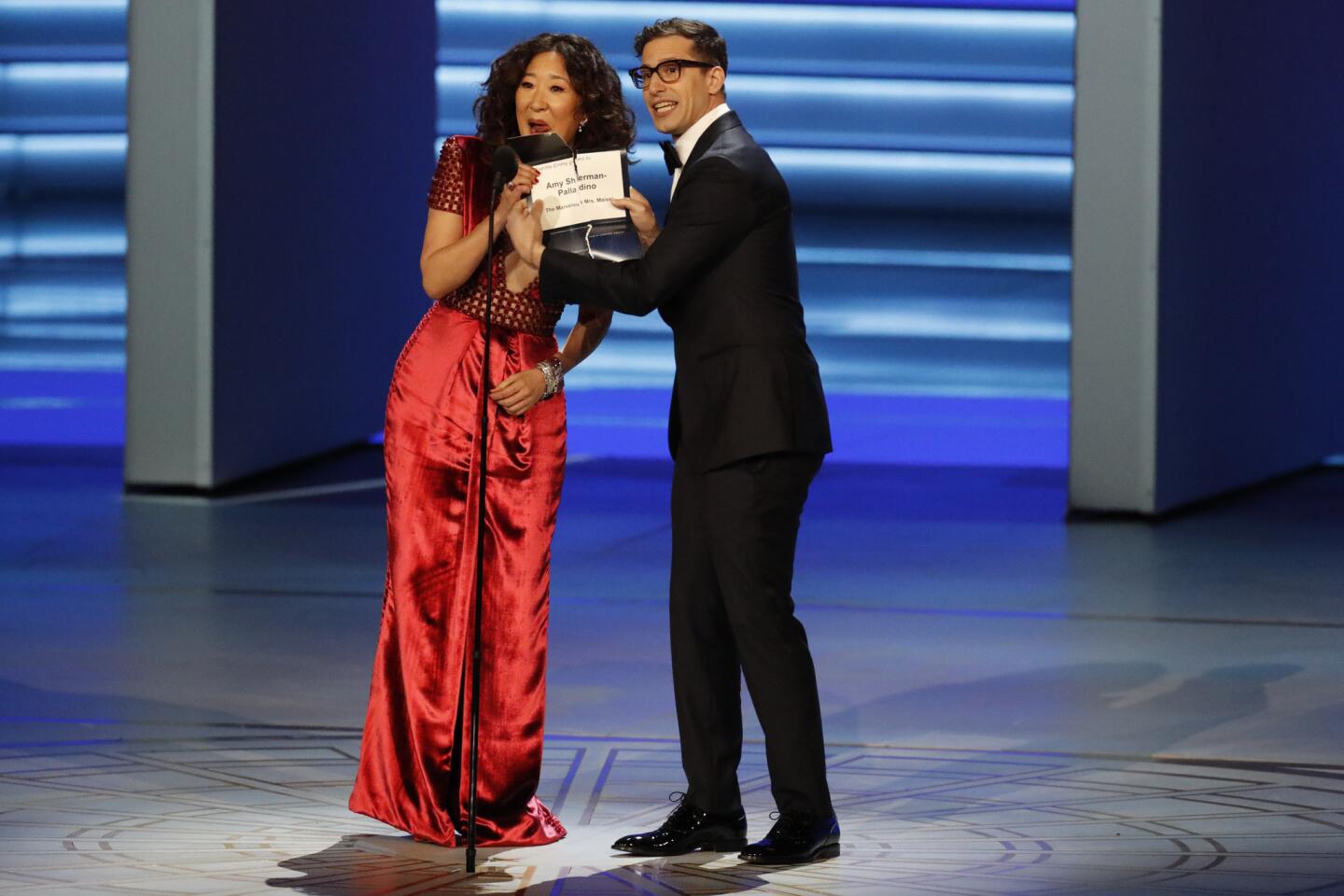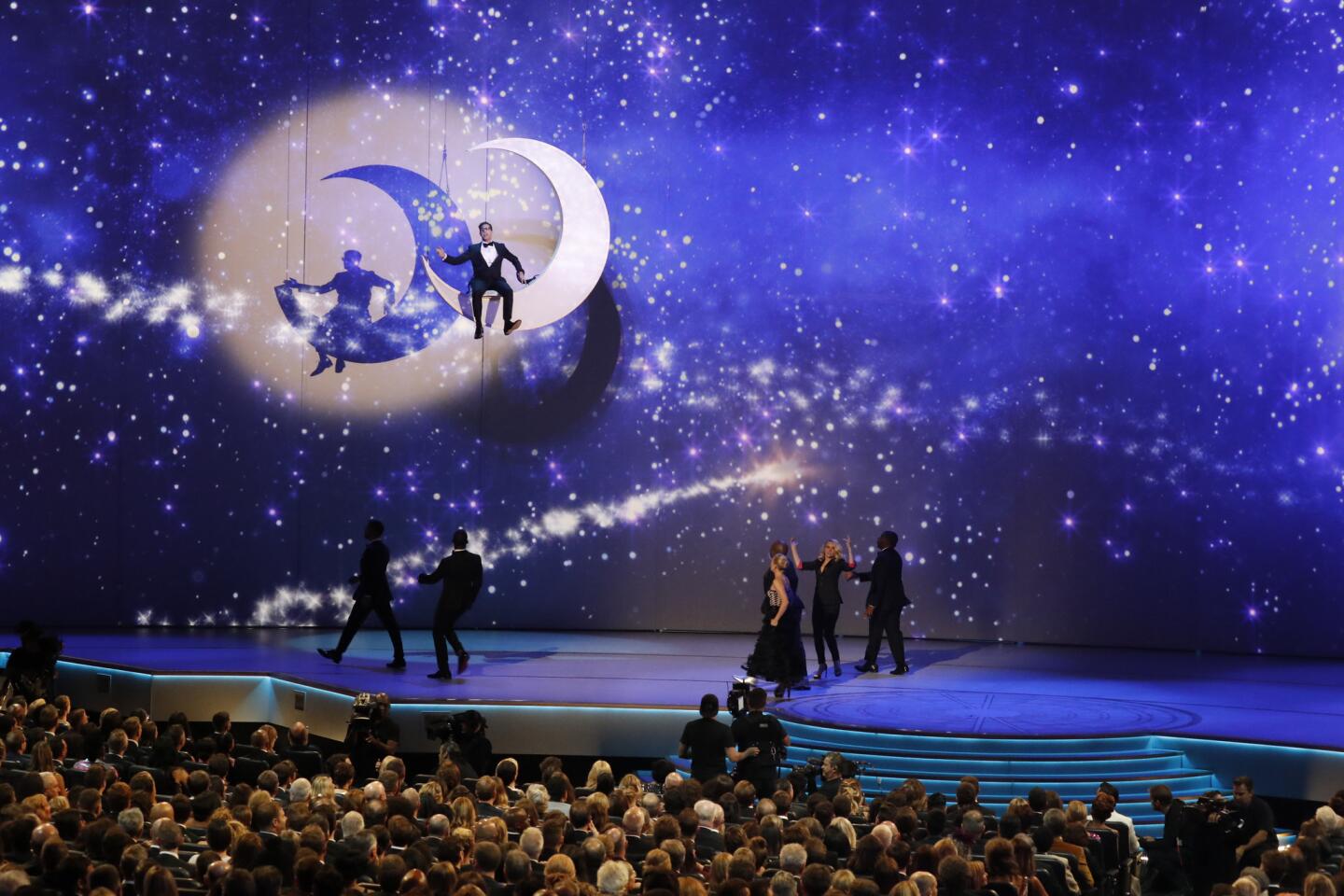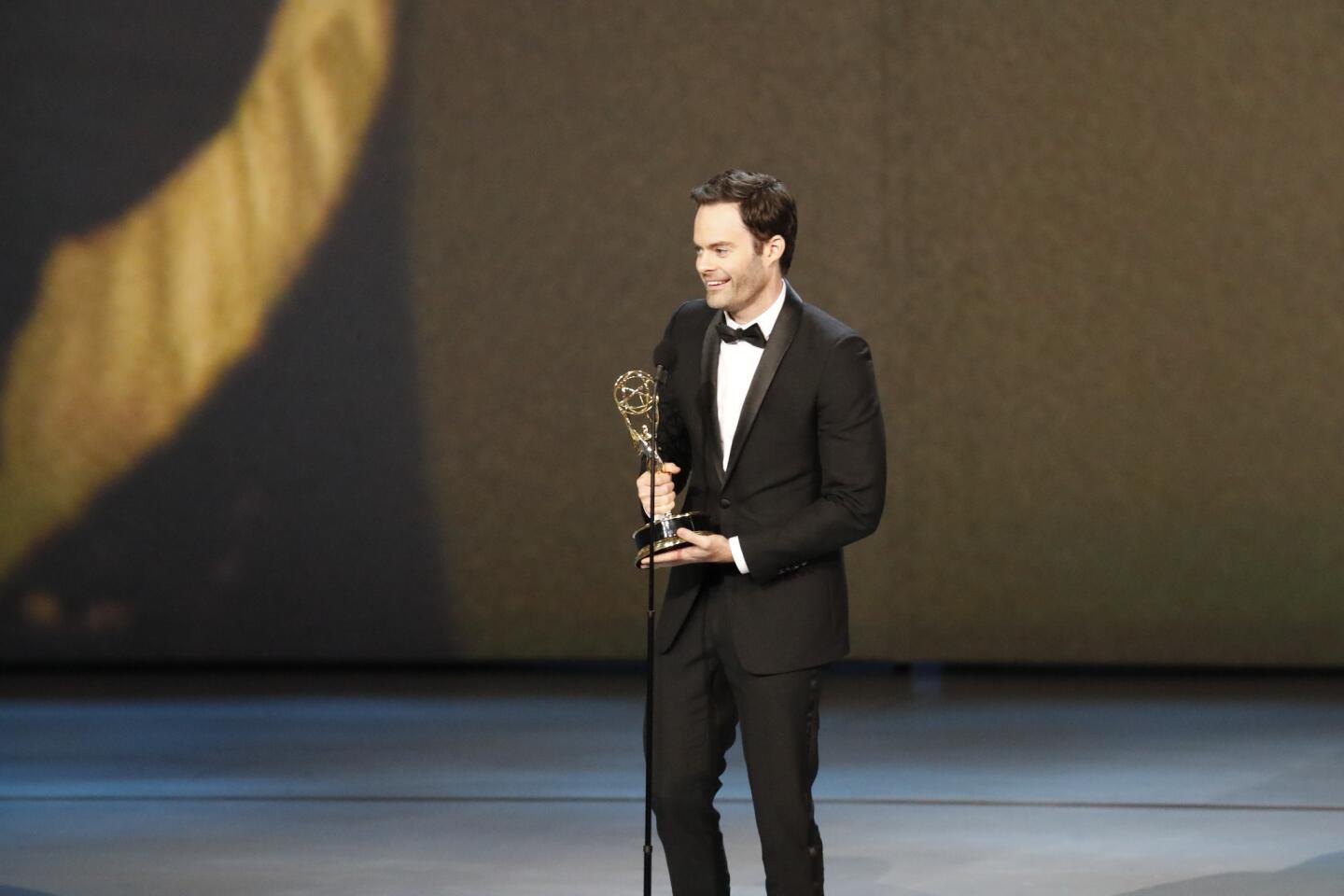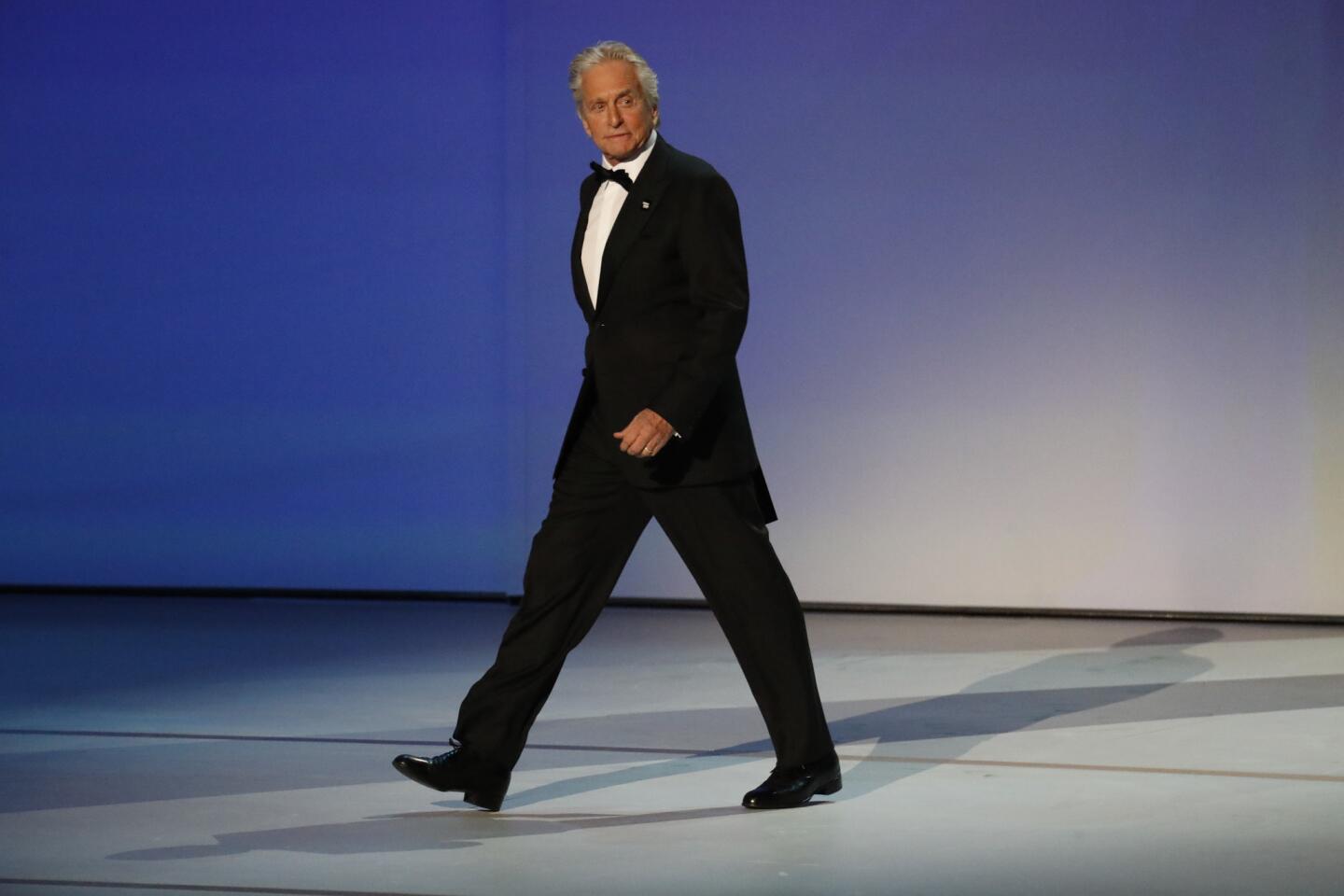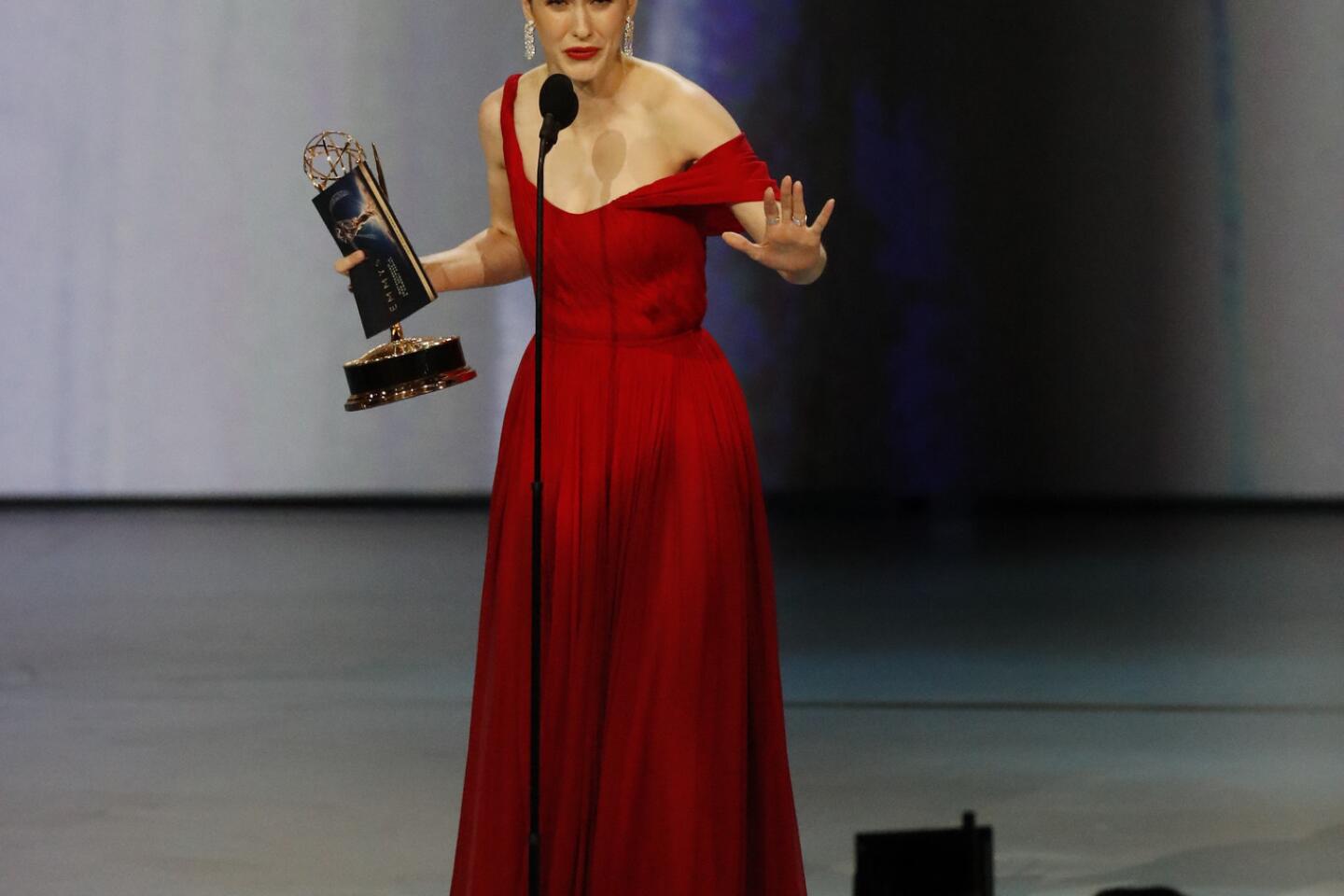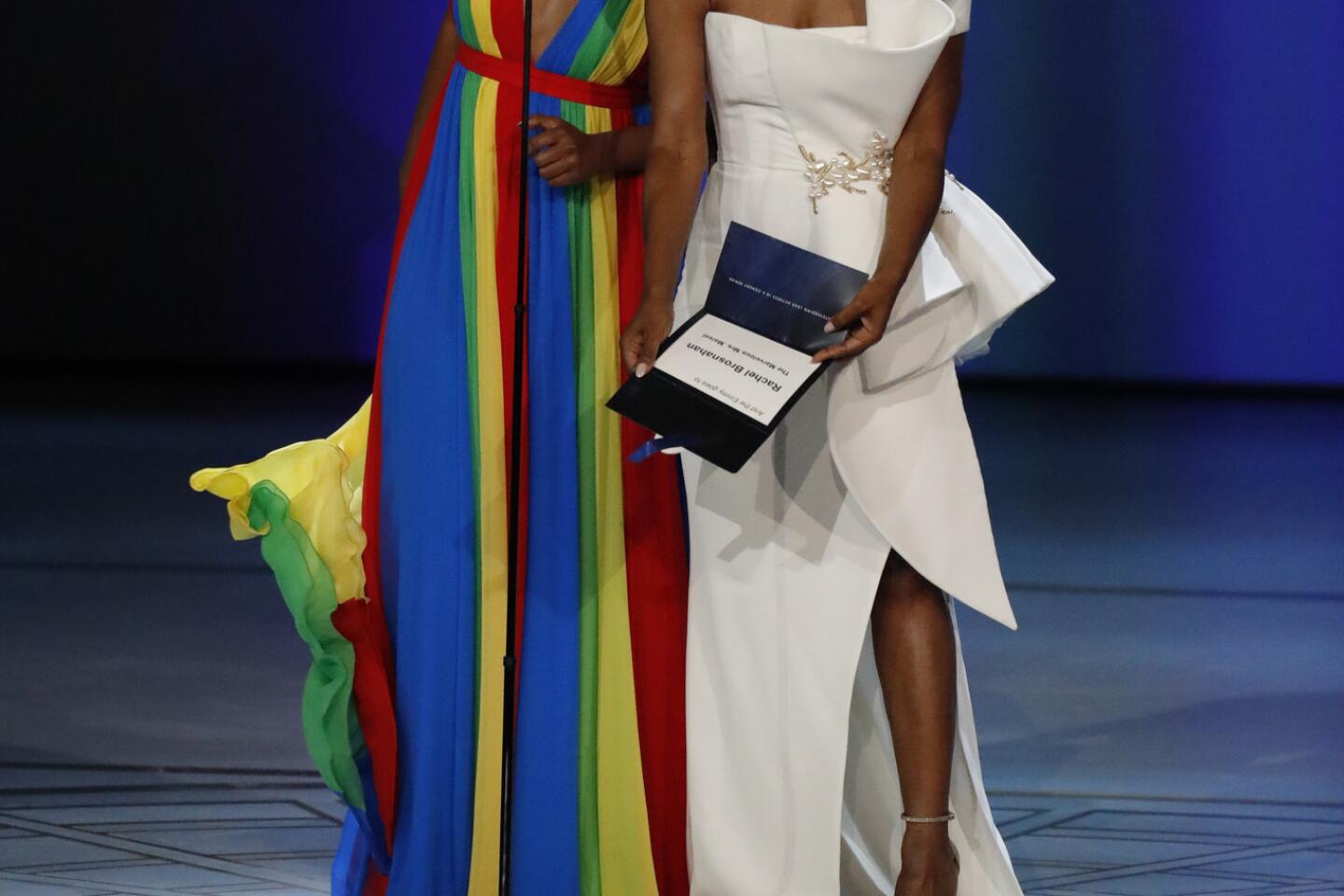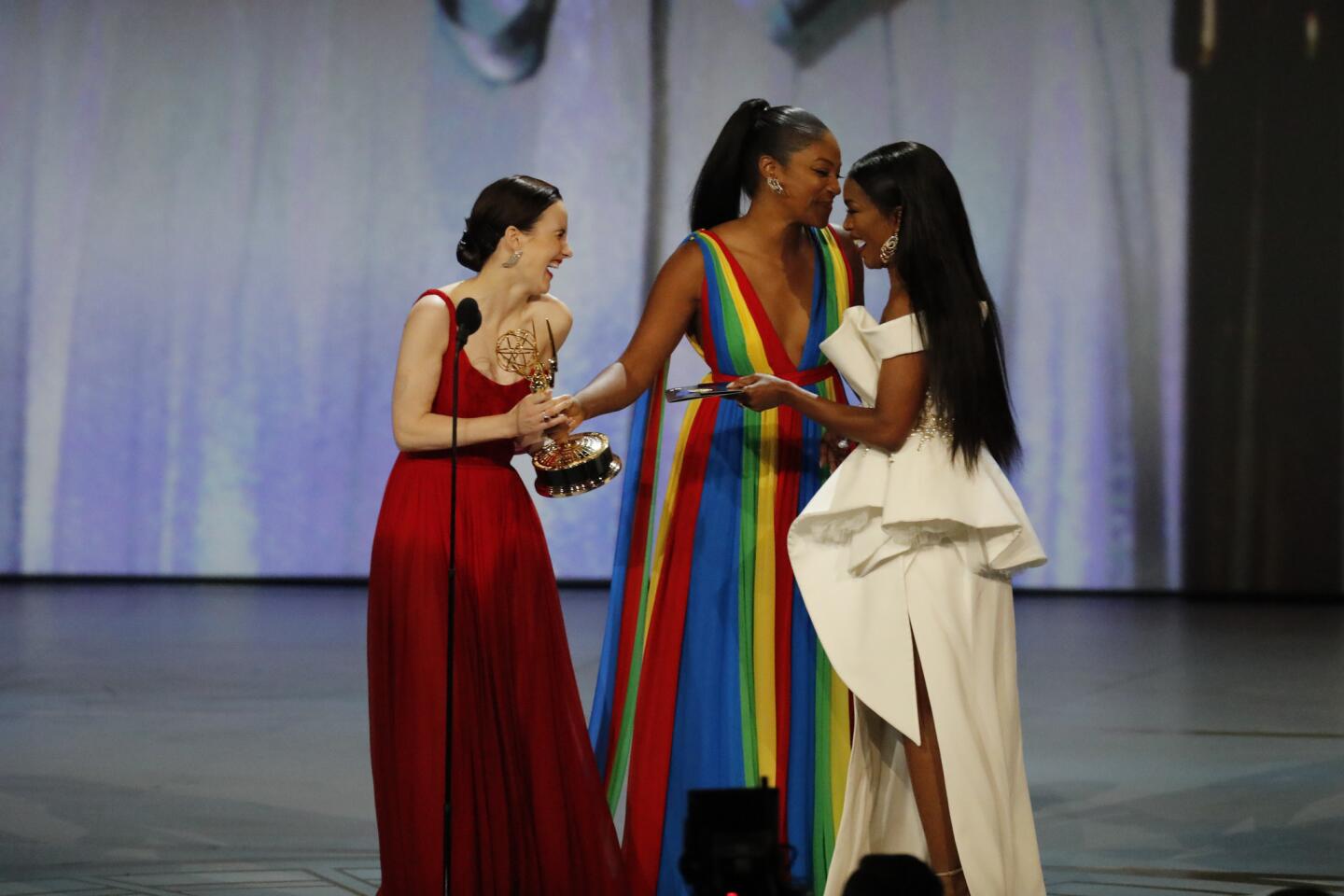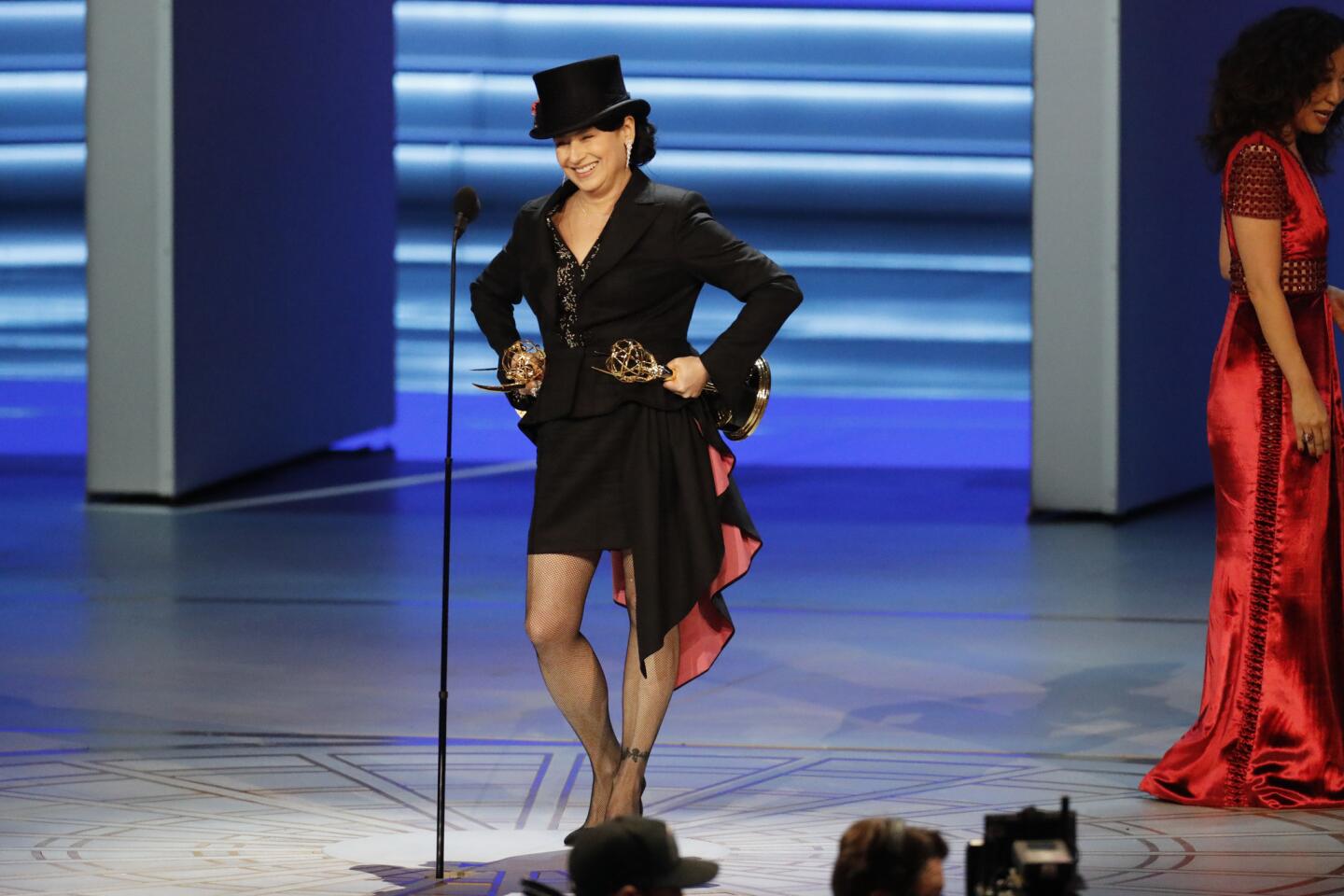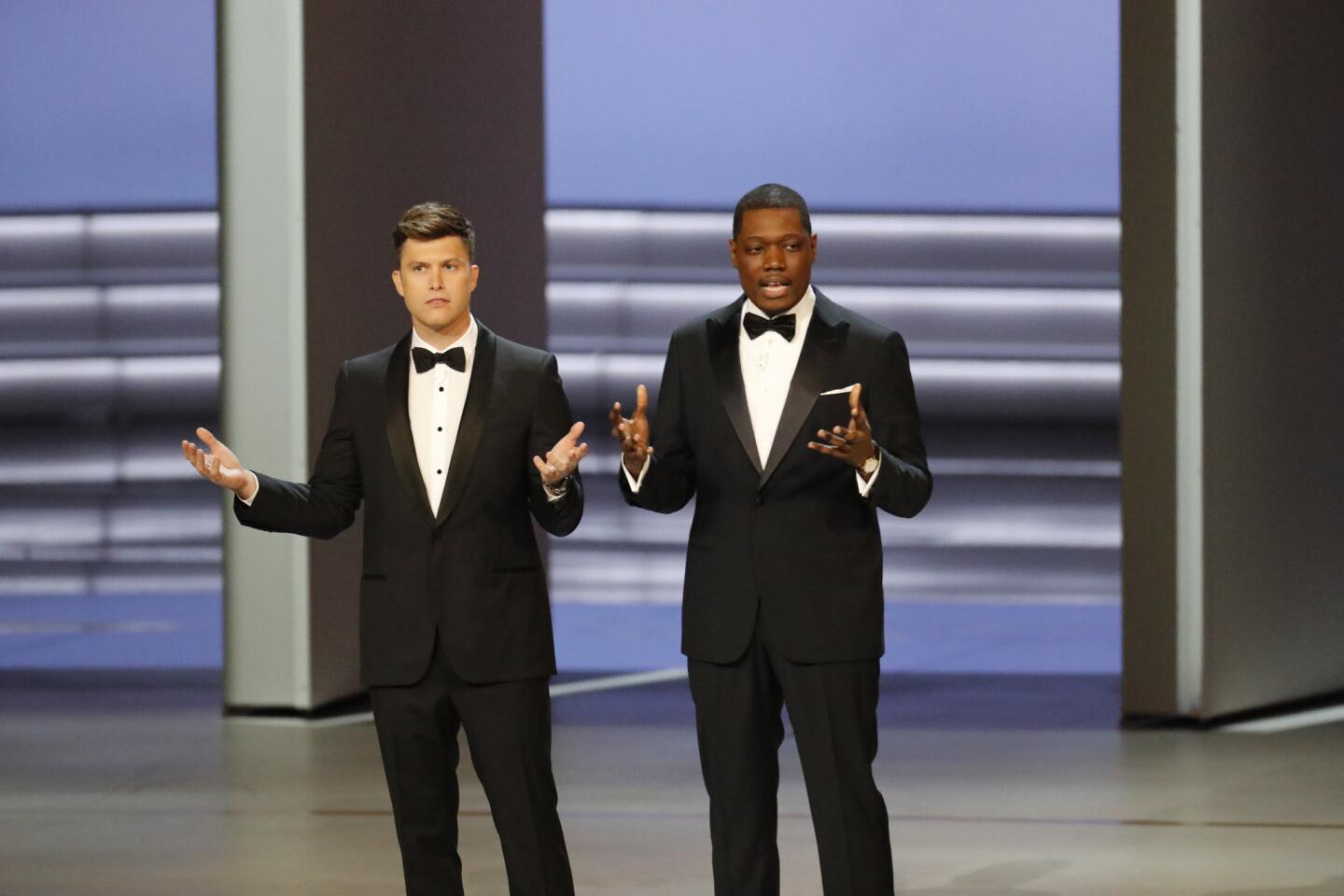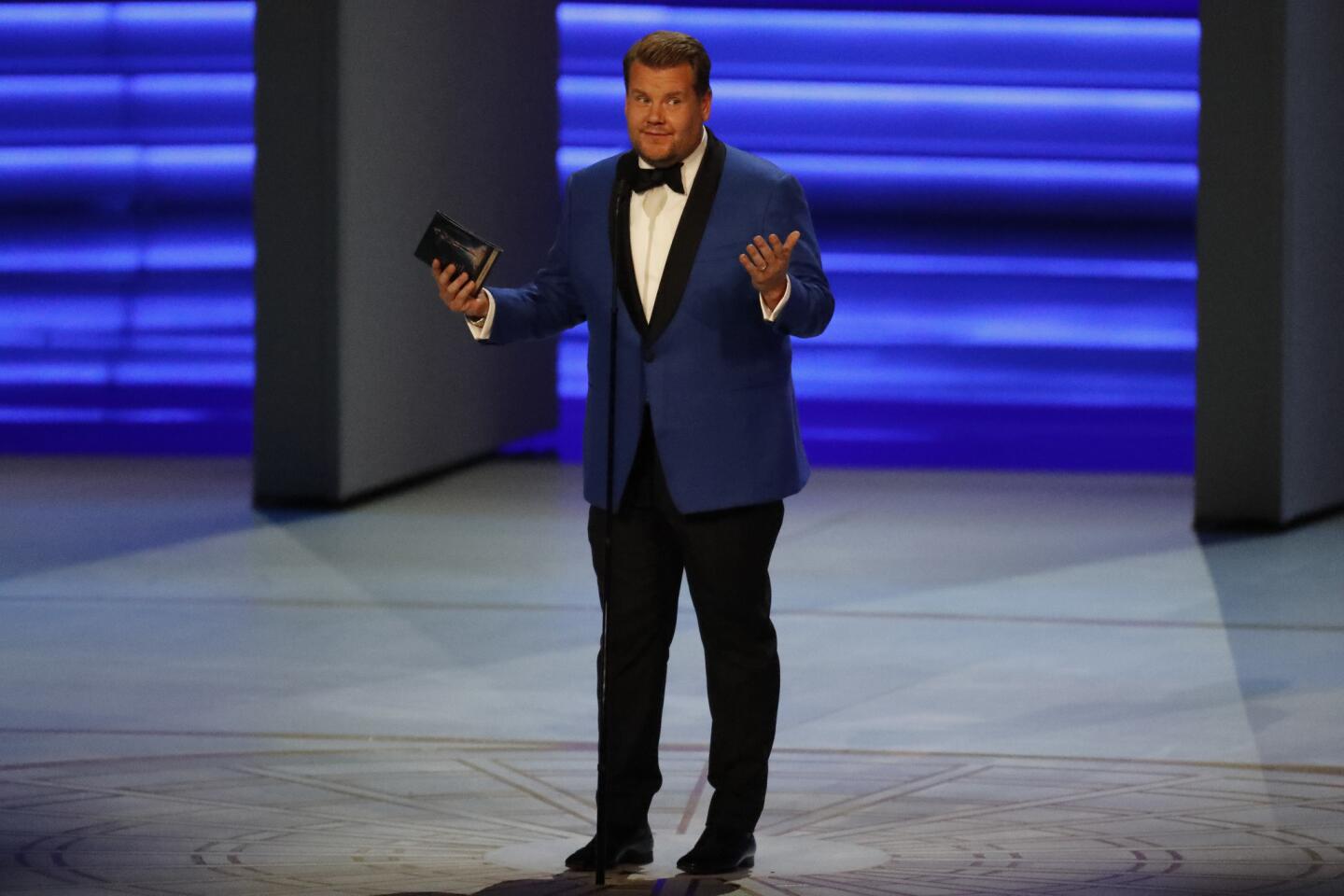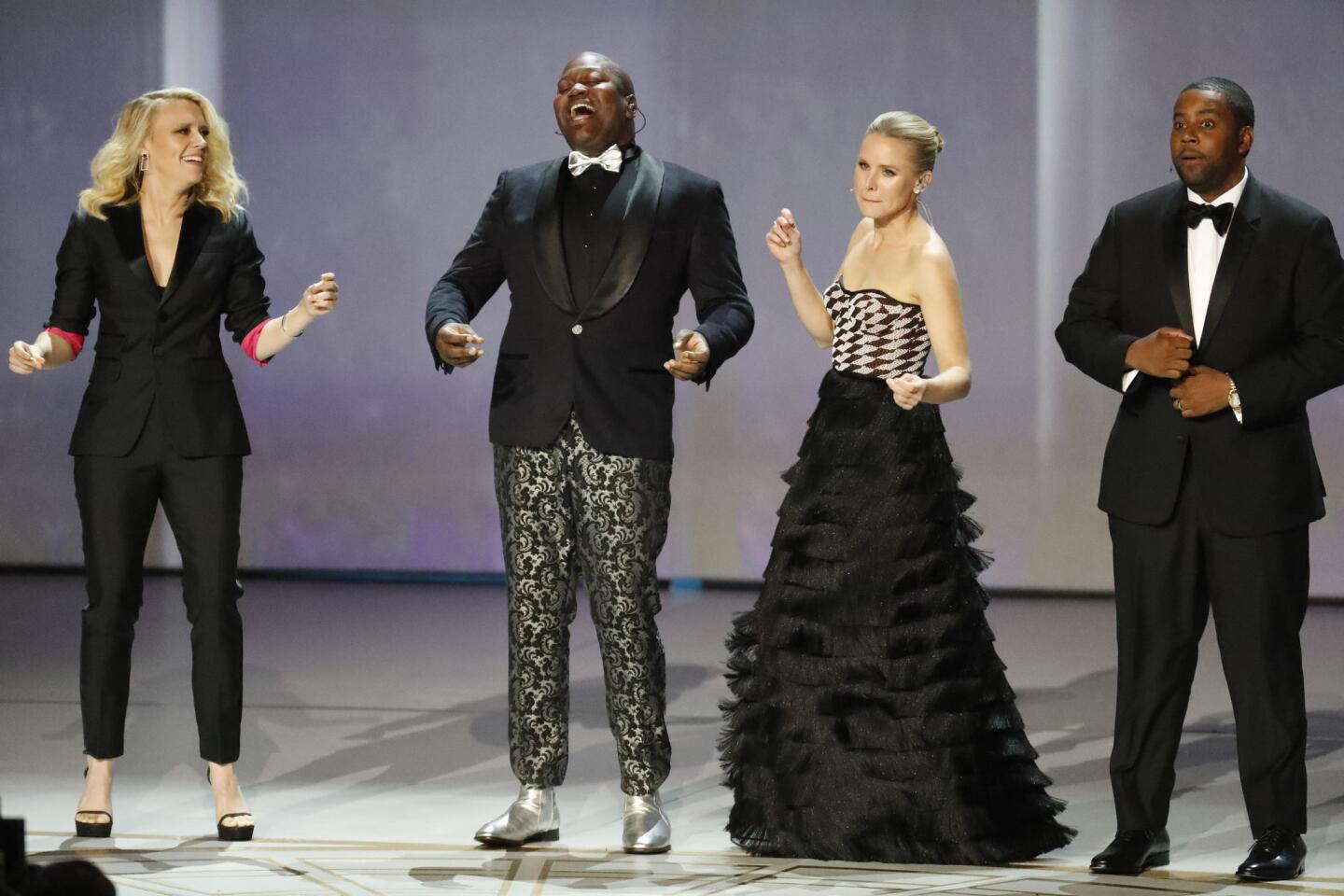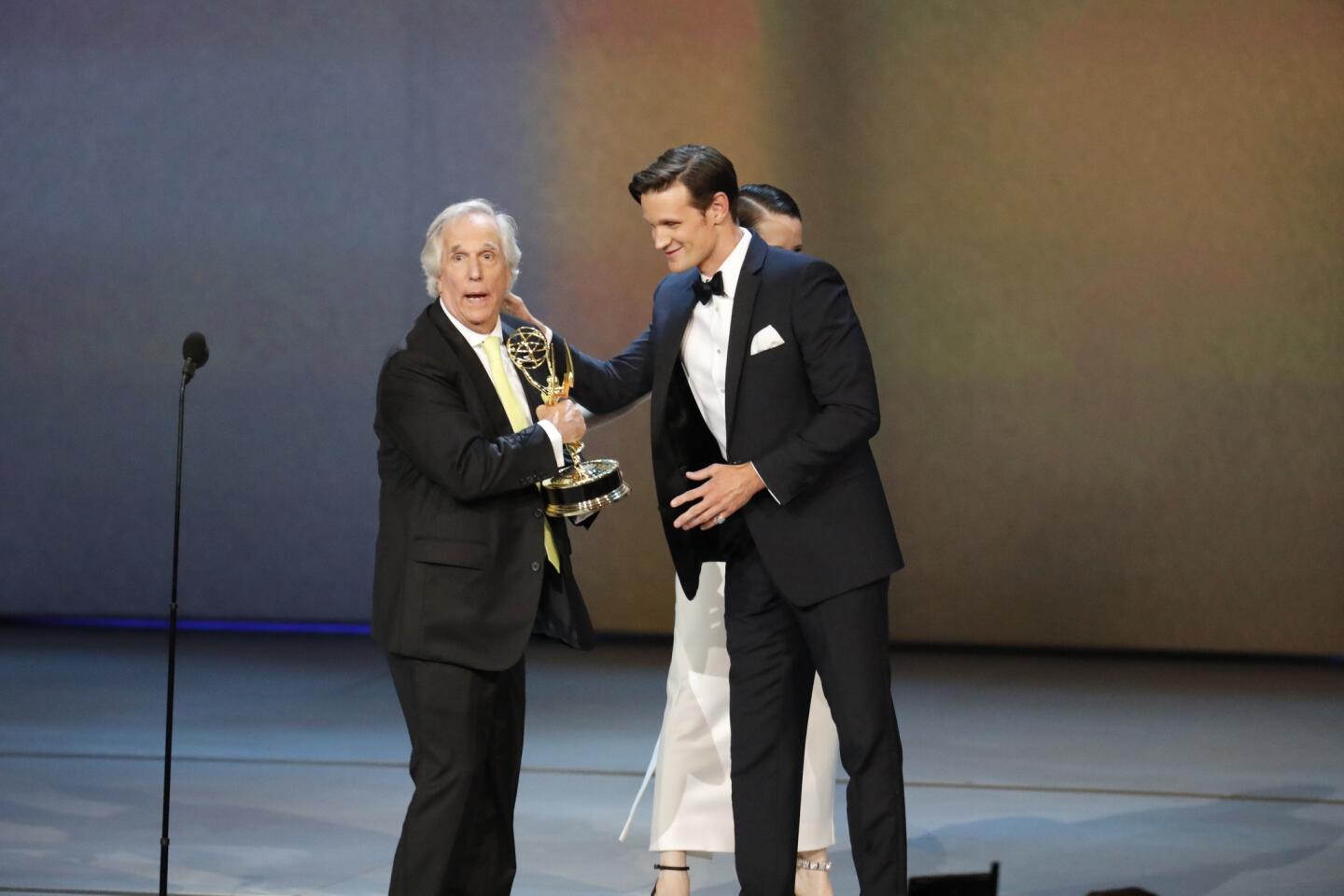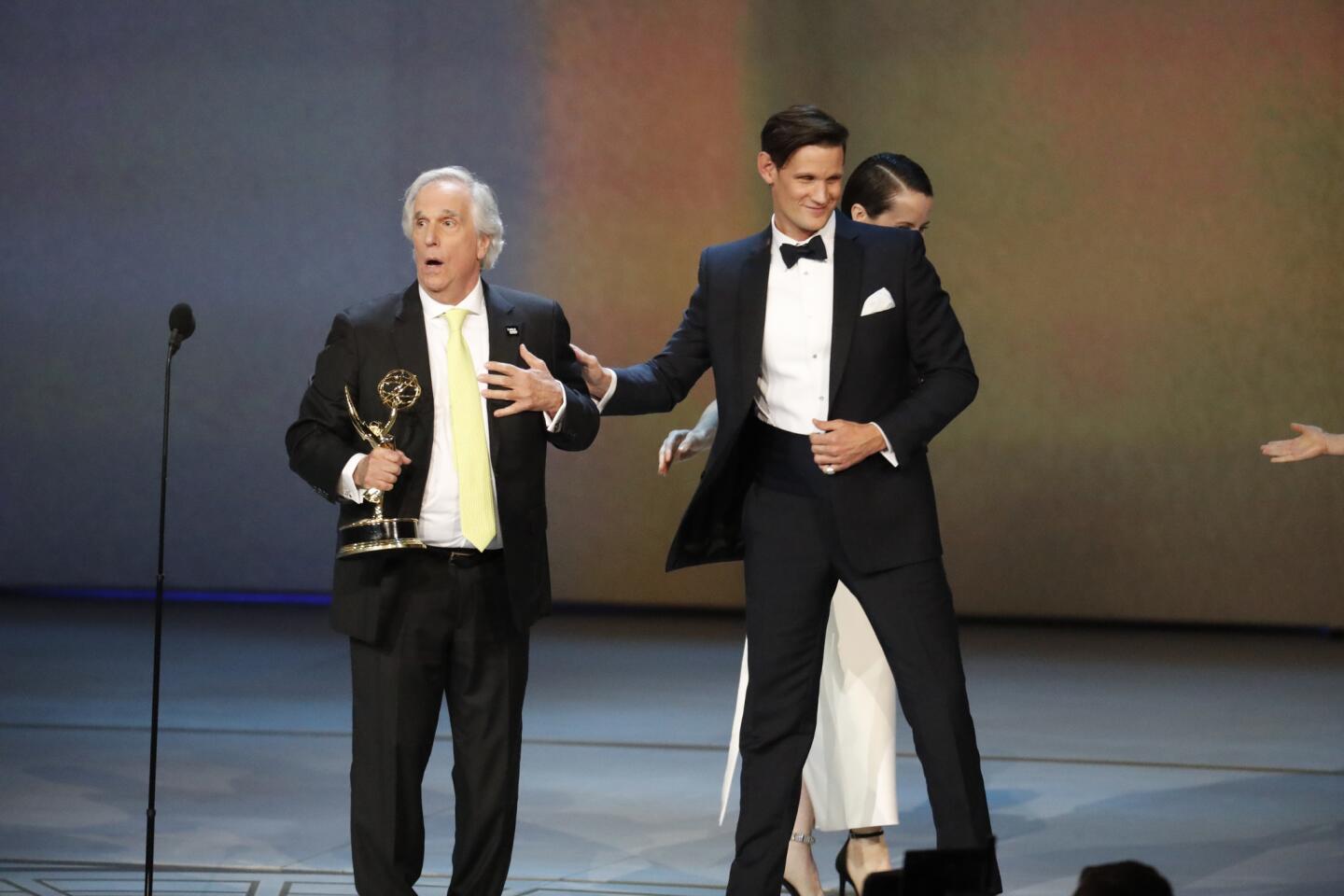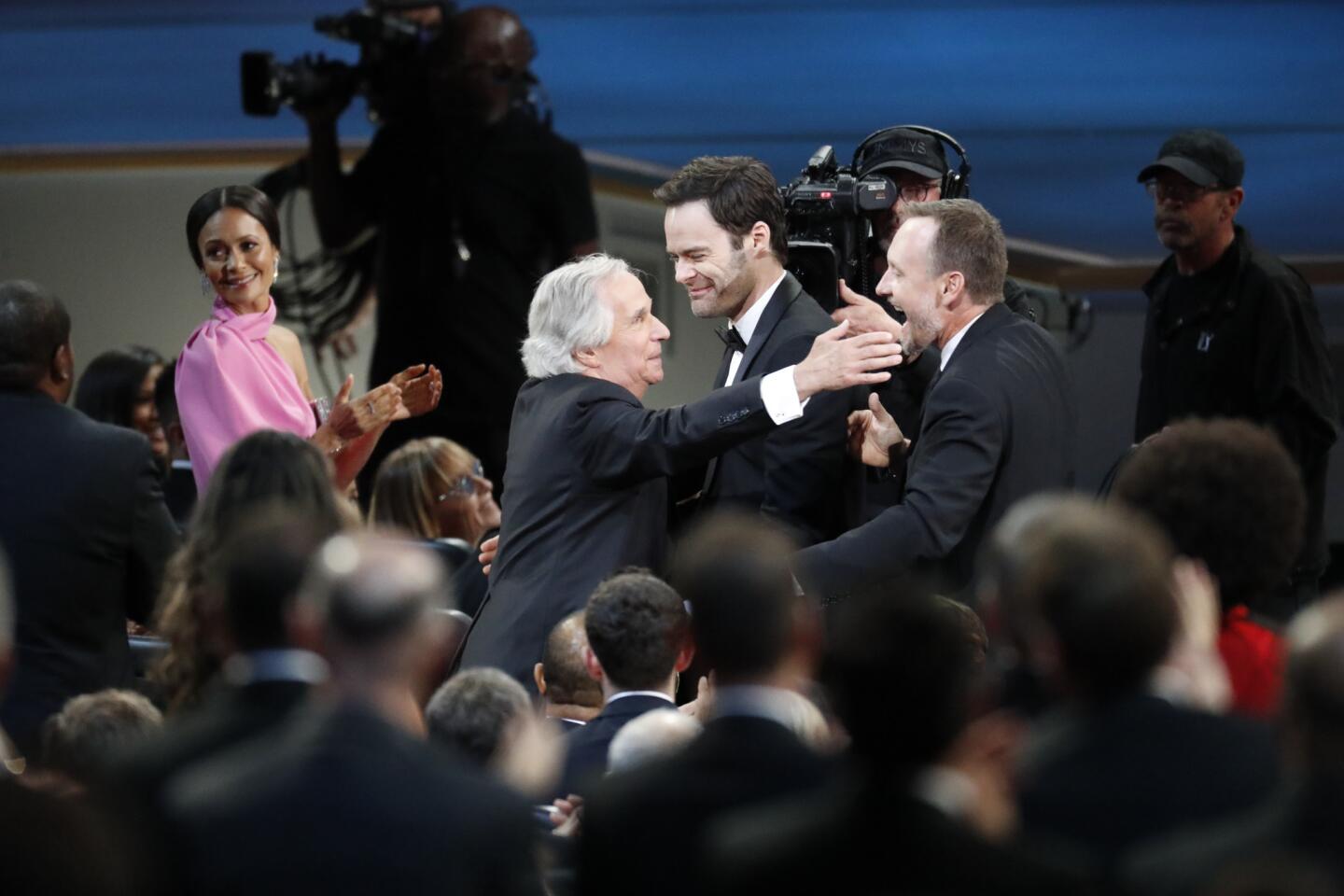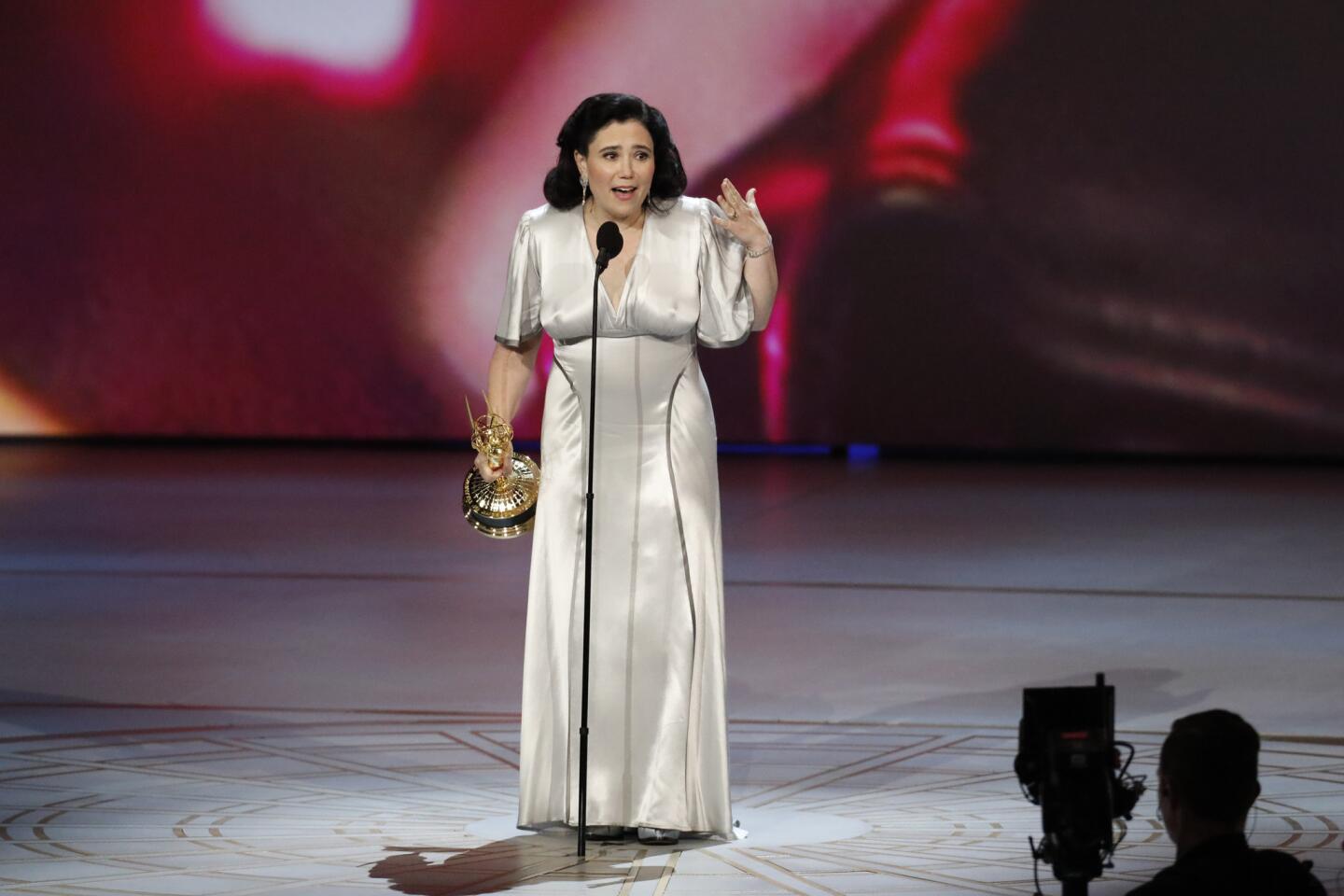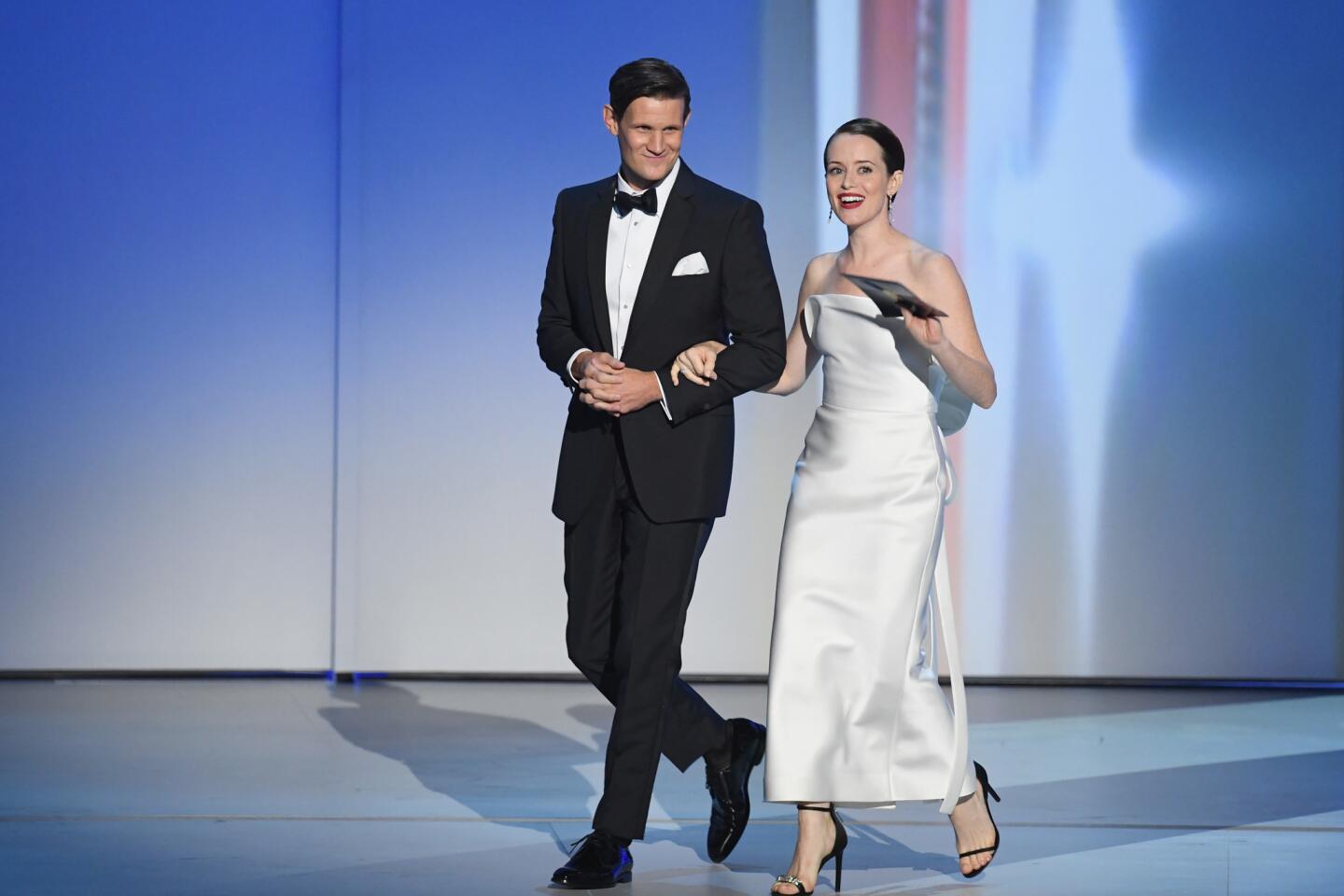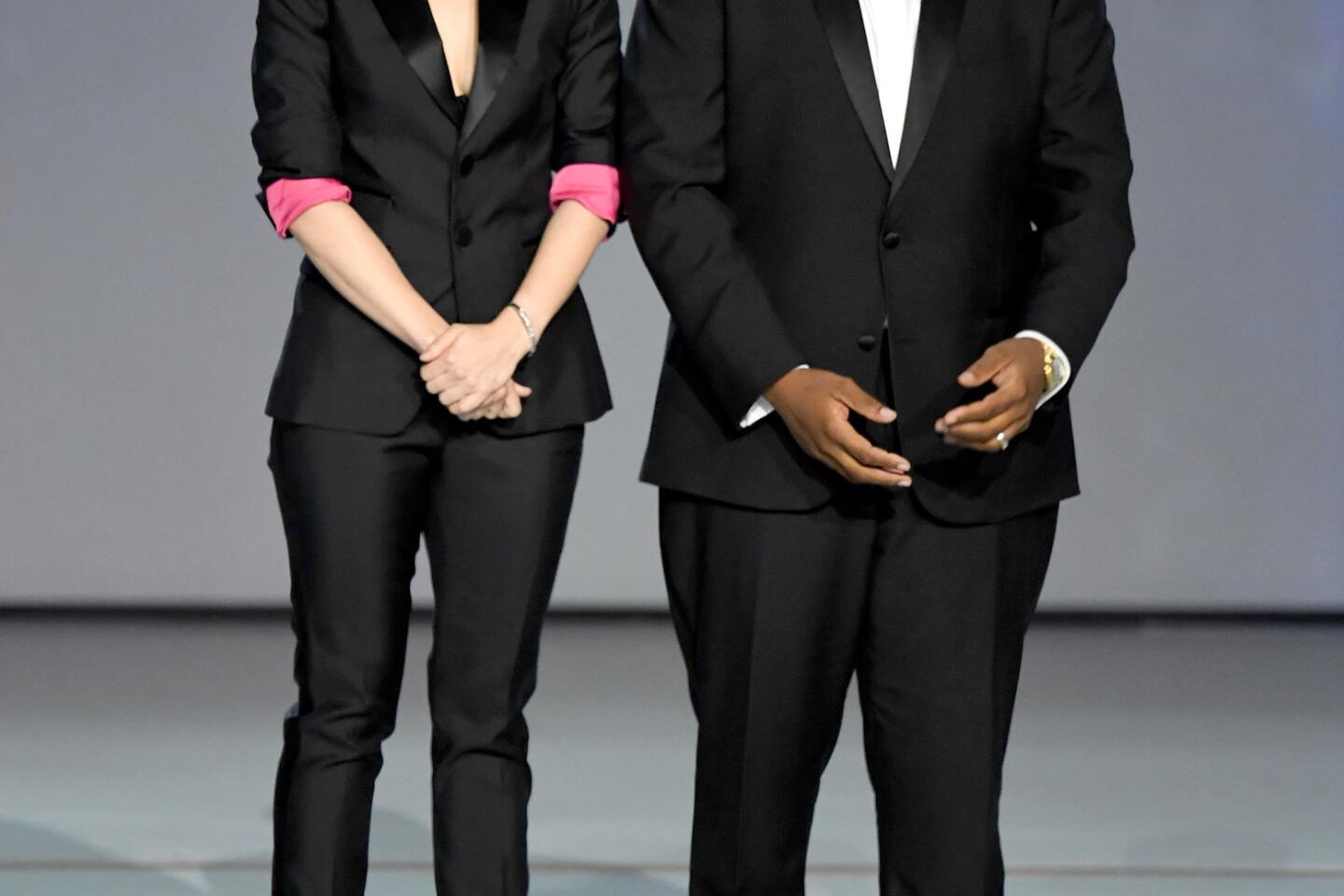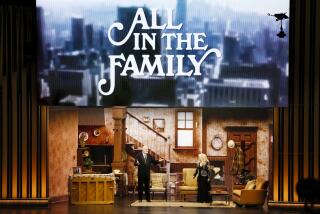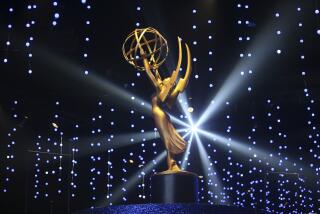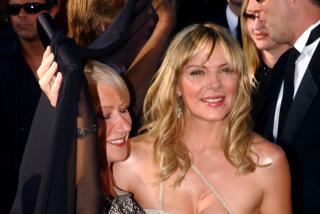And so we have put to bed the 70th running of the Emmy Awards, that night when the people of television go on to television to honor the people of television — some people of television anyway.
The broadcast, hosted by “Saturday Night Live’s” “Weekend Update” co-anchors Michael Che and Colin Jost, and produced by “SNL” creator Lorne Michaels, aired on a Monday, unusually, because NBC, whose turn it was to broadcast the ceremony, had football on Sunday.
Here are the questions a reviewer must ask of any modern awards show: Did it run on time? In running on time, was it cruel to the people it was supposedly made to celebrate? Was whatever was roiling the news, from outside the industry or within it, or from both at once, addressed seriously, whimsically, ironically, facetiously or embarrassingly, or not at all? Was the host or hosts funny? Did that crazy thing that happened make it all worthwhile?
This year’s crazy thing was an acceptance speech by Glenn Weiss, who won for directing the 2018 Oscars broadcast, which doubled as a marriage proposal. (If you’re going to hijack the Emmys broadcast, it helps to be on a first-name basis with its director.) “There are so many guys with rings in their pockets that didn’t win now,” said Jost.
Glenn Weiss used his time onstage, accepting the variety special directing award for this year’s Oscars, to propose.
FULL COVERAGE: Live updates | Winners list | Show highlights
Irony was the opening gambit, a way to address the fact that Hollywood has only begun to engage its historic lack of diversity. Like an episode of “Saturday Night Live,” the hosts came in after a cold open. “SNL” castmates Kate McKinnon and Kenan Thompson were the first people to take the stage, the latter announcing that this year’s was “the most diverse group of nominees in Emmy history; I’m going to go ahead and say it, we solved it,” which led to a modest production number on the subject of diversity no longer being an issue, performed with a company including Kristen Bell, Ricky Martin, Tituss Burgess, Ru Paul and Andy Samberg, as the token straight white guy, and “The One of Each Dancers.”
At three hours, the Emmys are twice the length of a “Saturday Night Live” episode, which is to say, they are unwieldy and subject to patches where nothing is funny. Still, even the routines that fell flat, such as an unfortunately recurring bit with “SNL” alumni (and “Forever” co-stars) Fred Armisen and Maya Rudolph as unprepared Emmy experts, had their moments. Which, after all, is very like “Saturday Night Live.”
Apart from a number of Roseanne Barr jokes, few people in the news — or for that matter, in the crowd — were addressed directly. As close as disgraced, newly former CBS chief Les Moonves, the biggest elephant in the room — who was not actually in the room — came to being named was a joke, the punchline of which was “Ronan Farrow is on line one.” The president, so often the target of japes and jabs, was largely off the docket. The acceptance speeches too, perhaps because they were so compact, tended not to stray from the business at hand.
The double-act opening monologue had the feel of “Weekend Update,” delivered standing, in tuxedoes, to an auditorium filled, said Che, “with the many, many talented and creative people in Hollywood who haven’t been caught yet.”
“This year,” said Jost, “the audience is allowed to drink in their seats. Because the one thing Hollywood needs right now is people losing their inhibitions at a work function.”
1/54
The cast and crew of “Game of Thrones” on stage accepting the outstanding drama series award during the show at the 70th Primetime Emmy Awards.
(Brian van der Brug / Los Angeles Times) 2/54
With a huge show background, the cast and crew of “Game of Thrones” on stage accepting the outstanding drama series award during the show at the 70th Primetime Emmy Awards at the Microsoft Theater in Los Angeles.
(Brian van der Brug / Los Angeles Times) 3/54
Daniel Palladino speaks onstage with cast after winning outstanding comedy series for “The Marvelous Mrs. Maisel.”
(Brian van der Brug / Los Angeles Times) 4/54
Ryan Murphy accepts the Emmy for outstanding limited series for “The Assassination Gianni Versace: American Crime Story,” during the 70th Primetime Emmy Awards.
(Brian van der Brug / Los Angeles Times) 5/54
Lorne Michaels accepts the outstanding variety sketch series award for “Saturday Night Live” at the 70th Primetime Emmy Awards at the Microsoft Theater.
(Brian van der Brug / Los Angeles Times) 6/54
Cast and crew take to the stage as “RuPaul’s Drag Race” wins the Emmy for outstanding reality-competition program for the first time.
(Brian van der Brug / Los Angeles Times) 7/54
RuPaul accepting the Emmy for outstanding reality competition program.
(Brian van der Brug / Los Angeles Times) 8/54
From the Emmys audience at the Microsoft Theater, Leslie Jones cheers for RuPaul and “Drag Race” after the show won the Emmy for outstanding reality competition program.
(Brian van der Brug / Los Angeles Times) 9/54
“The Crown’s” Claire Foy wins the award for outstanding lead actress in a drama series.
(Brian van der Brug / Los Angeles Times) 10/54
Sarah Paulson presents the award for outstanding lead actress in a drama series.
(Brian van der Brug / Los Angeles Times) 11/54
“The Handmaid’s Tale” actresses Elisabeth Moss, left, and Samira Wiley present during the 70th Primetime Emmy Awards at the Microsoft Theater.
(Brian van der Brug / Los Angeles Times) 12/54
“Game of Thrones” creator George R.R. Martin, left, and series star Nikolaj Coster-Waldau chat at the 70th Primetime Emmy Awards.
(Alex Berliner / Invision for the Television Academy) 13/54
Glenn Weiss turns his acceptance speech for outstanding directing for a variety special for “The Oscars” into a surprise marriage proposal that quickly went viral.
(Chris Pizzello / Invision / Associated Press) 14/54
Matthew Rhys accepts his Emmy for outstanding lead actor in a drama series for “The Americans.”
(Brian van der Brug / Los Angeles Times) 15/54
“Queer Eye’s” Bobby Berk, from left, Karamo Brown, Tan France, Antoni Porowski and Jonathan Van Ness present an award at the 70th Primetime Emmy Awards.
(Brian van der Brug / Los Angeles Times) 16/54
Television Academy Chairman Hayma Washington speaks during the Emmy Awards.
(Brian van der Brug / Los Angeles Times) 17/54
Gina Rodriguez and Lil Rel Howery present the Emmy for outstanding writing in a drama series at the 70th Primetime Emmy Awards.
(Brian van der Brug / Los Angeles Times) 18/54
Ron Cephas Jones, left, and Sterling K. Brown present the award for outstanding directing for a variety special at the 70th Primetime Emmy Awards.
(Chris Pizzello / Invision / Associated Press) 19/54
RuPaul Charles and Leslie Jones present the Emmy award for outstanding lead actress in a limited series, movie or dramatic special.
(Chris Pizzello / Invision / Associated Press) 20/54
Married couple Chrissy Teigen and John Legend present the award for outstanding supporting actress in a limited series, movie or dramatic special at the 70th Primetime Emmy Awards.
(Chris Pizzello / Invision / Associated Press) 21/54
Regina King accepts the Emmy award for outstanding lead actress in a limited series, movie or dramatic special for “Seven Seconds.”
(Chris Pizzello / Invision / Associated Press) 22/54
Ryan Murphy accepts the award for outstanding directing in a limited series, movie or dramatic special for “The Assassination of Gianni Versace: American Crime Story.”
(Chris Pizzello / Invision / Associated Press) 23/54
Darren Criss accepts the award for outstanding lead actor in a limited series, movie or dramatic special for “The Assassination of Gianni Versace: American Crime Story” at the 70th Primetime Emmy Awards.
(Chris Pizzello / Invision / Associated Press) 24/54
Jeff Daniels accepts the outstanding lead actor in a limited series or movie award for “Godless.” Yes, he thanked his horse.
(Brian van der Brug / Los Angeles Times) 25/54
Thandie Newton accepts the outstanding supporting actress in a drama series award for “Westworld” at the 70th Primetime Emmy Awards.
(Brian van der Brug / Los Angeles Times) 26/54
John Mulaney accepts the award for outstanding writing for a variety special at the 70th Primetime Emmy Awards.
(Brian van der Brug / Los Angeles Times) 27/54
Producer Glenn Weiss proposes to his girlfriend Jan Svendsen onstage at the 70th Emmys after he won the variety special directing award for the Oscars.
(Brian van der Brug / Los Angeles Times) 28/54
Peter Dinklage accepts the Emmy for outstanding supporting actor in a drama series for “Game of Thrones.”
(Brian van der Brug / Los Angeles Times) 29/54
Peter Dinklage accepts the outstanding supporting actor in a drama series award for his role in “Game of Thrones.”
(Brian van der Brug / Los Angeles Times) 30/54
Charlie Brooker, left, and William Bridges accept the Emmy for outstanding writing for a limited series, movie or dramatic special for the “USS Callister” installment of “Black Mirror.”
(Brian van der Brug / Los Angeles Times) 31/54
John Legend performs at the 70th Primetime Emmy Awards.
(Chris Pizzello / Invision / Associated Press) 32/54
Betty White gets a standing ovation in her surprise appearance at the 70th Primetime Emmy Awards as Kate McKinnon and Alec Baldwin look on.
(Brian van der Brug / Los Angeles Times) 33/54
Betty White acknowledges presenter Kate McKinnon onstage at the 70th Primetime Emmy Awards.
(Brian van der Brug / Los Angeles Times) 34/54
Hosts Colin Jost, left, and Michael Che share a laugh with presenters Maya Rudolph and Fred Armisen during the Emmy Awards.
(Brian van der Brug / Los Angeles Times) 35/54
Merritt Wever accepts her Emmy for outstanding supporting actress in a limited series or movie for “Godless.”
(Brian van der Brug / Los Angeles Times) 36/54
Alex Borstein makes a quick wardrobe change before heading onstage to accept the award for outstanding supporting actress in a comedy series for “The Marvelous Mrs. Maisel.”
(Chris Pizzello / Invision / Associated Press) 37/54
Millie Bobby Brown, left, and Emilia Clarke present the award for outstanding writing for a comedy series.
(Phil McCarten / Invision for the Television Acad) 38/54
Sandra Oh, left, and Andy Samberg present the Outstanding Directing for a Comedy Series award onstage during the 70th Emmy Awards.
(Brian van der Brug / Los Angeles Times) 39/54
Andy Samberg drops in during the Emmys’ opening skit, a tongue-in-cheek musical on diversity in Hollywood.
(Brian van der Brug / Los Angeles Times) 40/54
Bill Hader accepts the outstanding lead actor in a comedy series award for “Barry.” But don’t ask him what he covered in the speech: “I legit don’t know what I said up there.”
(Brian van der Brug / Los Angeles Times) 41/54
Presenter Michael Douglas strolls onstage at the 70th Primetime Emmy Awards.
(Brian van der Brug / Los Angeles Times) 42/54
Rachel Brosnahan accepts the outstanding lead actress in a comedy series award for “The Marvelous Mrs. Maisel.”
(Brian van der Brug / Los Angeles Times) 43/54
Tiffany Haddish and Angela Bassett present onstage during the 70th Primetime Emmy Awards.
(Brian van der Brug / Los Angeles Times) 44/54
Rachel Brosnahan accepts the Outstanding Lead Actress in a Comedy Series award for “The Marvelous Mrs. Maisel” from Tiffany Haddish and Angela Bassett during the 70th Primetime Emmy Awards.
(Brian van der Brug / Los Angeles Times) 45/54
Amy Sherman-Palladino holds tight to her two Emmy wins for comedy writing and directing for “The Marvelous Mrs. Maisel.”
(Brian van der Brug / Los Angeles Times) 46/54
Hosts Colin Jost, left, and Michael Che start the show at the 70th Primetime Emmy Awards at the Microsoft Theater in Los Angeles.
(Brian van der Brug / Los Angeles Times) 47/54
Presenter James Corden at the 70th Primetime Emmy Awards.
(Brian van der Brug / Los Angeles Times) 48/54
Kate McKinnon, left, Titus Burgess, Kristen Bell and Kenan Thompson share some laughs onstage during the 70th Primetime Emmy Awards.
(Brian van der Brug / Los Angeles Times) 49/54
Henry Winkler shares his jubilation after winning the Emmy for outstanding supporting actor in a comedy series for “Barry.”
(Brian van der Brug / Los Angeles Times) 50/54
“Daddy won!” said Henry Winkler to his kids in closing his speech after winning his first Emmy.
(Brian van der Brug / Los Angeles Times) 51/54
Henry Winkler hugs Bill Hader, left, and Alec Berg after his win for outstanding supporting actor in a comedy series. “Westworld’s” Thandie Newton, in pink, is part of the standing ovation and would go on to win the Emmy for supporting actress in a drama series.
(Brian van der Brug / Los Angeles Times) 52/54
After a truly showstopping shimmy to the stage, Alex Borstein accepts the outstanding supporting actress in a comedy series award for “The Marvelous Mrs. Maisel.”
(Brian van der Brug / Los Angeles Times) 53/54
Matt Smith and Claire Foy head onstage to crown the first trophy winner at the 70th Primetime Emmy Awards.
(Kevin Winter / Getty Images) 54/54
Kate McKinnon and Kenan Thompson kick off the 70th Emmy Awards with an opening skit.
(Kevin Winter / Getty Images) On “Weekend Update,” Che frequently deals in racial issues, and his Emmy gig was no different; indeed, in one joke, he described the Emmys itself as “a white people’s award show.” He described “The Handmaid’s Tale” as the story of an “imaginary future where an entire group of people are forced to work and make babies against their will; it’s what black people call history. It’s ‘Roots’ for white women.” He also asked, “Can you believe they did 15 [seasons] of ‘ER’ without one Filipino nurse. Have you been to a hospital?”
But diversity was an issue throughout the broadcast, which included a filmed segment in which Che awarded “Reparations Emmys” to stars of old black sitcoms. The evening’s last line was his as well: “Stay tuned for ‘Showtime at the the Apollo.’ ”
The production was streamlined without feeling hurried, marked by a crisp, efficiency, from the double-monologue; to the presenting (the nominees were announced by the disembodied, almost robotic voice of the announcer, the winners, by the presenters); to the set itself, a giant curved video screen that would part occasionally to reveal a giant Emmy statuette — if you can call something that big a statuette — and the orchestra. Winners stood before 30-foot-tall images of themselves (height approximate) that elegantly said “bigger than life.” On the whole, the show felt classy in an actually classy way.
At the same time, it was oddly downbeat. There were multiple jokes about the bitterness of Emmy losers. “Here’s to that that Emmy-sized hole in your soul,” said presenter Dave Chappelle of the happiness that success doesn’t bring. Similarly, jokes about the awkwardness of scripted banter among presenters only led to banter that proved … awkward. If you want to see big stars in embarrassing positions, skip the tabloids and go right to the awards shows.
robert.lloyd@latimes.com
Follow Robert Lloyd on Twitter @LATimesTVLloyd
